#there is a reason that russia looks more like imperial and not his father
Text
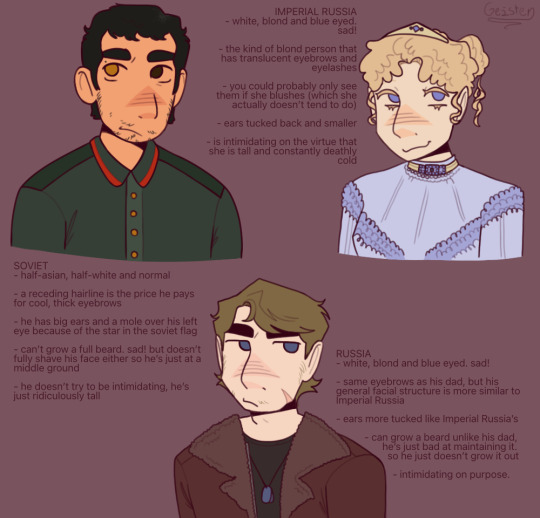

here’s a thing I made with soviet, imperial russia and russia because I wanted to somewhat compare all of them (+ a textless vers)
#countryhumans#ch ussr#ch imperial russia#ch russia#they’re very. linked in my mind#soviet-imperial because that was a direct fight between their two ideologies#and the creation of a new state and ‘destruction’ of the old#soviet-russia because they’re father and son#but also because there’s a presumed ‘continuation’ of one state to the other when it isn’t really so;#and there’s the russia-imperial connection because#although they never met#they’re the actual through line; the actual continuation#while they’re also a straight negation of one another through ideology#there is a reason that russia looks more like imperial and not his father
10 notes
·
View notes
Text
Barty Crouch Jr — name & origins
In spite of what one might believe, Barty Crouch Jr did not really hate his name.
His relationship with his father, Bartemius Crouch Sr, had never been good in any capacity. He never was deluded into thinking his father loved him. During his formative years, at first he tried to get his father to at least like him, but he gave up on that around his eight birthday.
Bartemius Crouch Sr had never seen Barty as anything more than an extension of himself. A legacy, a heir, his flesh and blood.
From what Barty has heard from his mama’s stories, his father’s reaction to her pregnancy had been relatively pleased. The problems started after his birth — after it became clear children need care, love. He also knew about her insistency on taking care of him by herself, of becoming a stay-at-home mom had been home of her last acts of resistance, of protecting him from his father’s treatment. An offer she extended upon finding a few weeks old Barty, Imperioused not to cry and hungry after a few hours she slept through, hours in which his father was supposed to watch him.
An extension of himself, in perhaps his most glaring display of egoism Bartemius Crouch Sr gifted his own name to.
All of which should reasonably, given Barty’s character, result in him absolutely despising the name. That was not fully the case.
He wasn’t sure why that was. Maybe it was because there was always a disconnect between ‘Bartemius’ — the father, and ‘Barty’ — the son. Barty couldn’t stand to be referred by his full name; all of his friends were familiar with his plan to legally change it to the shortened version when he turns seventeen.
Maybe it related to the way his mama’s voice, soft and gentle, well known and bringing a sense of security he could never find anywhere else, called out for him. The moments in which she looked beautiful and happy, out of the house, out of the country when they visited her family, babcię i dziadka, where they called him ‘Bartek’ and they could walk down the streets of Poland, so different than London, the city where he grew up.
Wizarding Poland was a complete mess. With the muggle wars, Nazis and currently reigning Soviets with their communism, the Iron Curtain breaking Europe into two, the population was not having a great time. Wizards had it better than muggles — the government rules allowed for Portkeys to be more available, and many were able to protect themselves from the bombings using spells and wards. Nonetheless, it didn’t erase the poverty. Barty remembered the shock the first time when he walked into a store with mama, and there was nothing on the shelves.
Wizards in Poland lived much closer with the muggles, he came to realize. They had an equivalent of the Statue of Secrecy, obviously, but the circumstances brought them together, in contrast to the separated state England unknowingly lived in. Wizarding Poland could never be nearly as removed from Muggle Poland, because Polish people were trying to simply survive and preserve their identity through over a century of their country being erased from the maps and the country being divided between Germany, Russia and Austria.
Wizards adapted to survive. Pure bloods overcame their prejudice to keep their history. The fight for freedom wasn’t over, but Barty knew they would never return to Britain’s levels of separation.
(Both of the sides of his family were Light, but Bartemius Crouch Sr could never deign himself to think about muggles as equals. It was reflected in the way he talked about them. Never with outright discrimination, but instead perpetuating the stereotypes and disrespect towards them. )
Barty loved it. It was the home London never was, with the Ministry of Magic so close, with the house he grew up in always at the back of his mind whenever he was walking the streets. He was sad every time they had to go back.
Barty loved his name, too. Not Bartemius, not Crouch (Jr). But just ‘Barty’. ‘Bartek’. He might’ve liked having his mother’s last name, too, but now, there’s no sense in changing it.
(He’ll be taking his husband’s one, after all.)
#harry potter#hp#marauders#marauders era#slytherin skittles#the emeralds#dead gay wizards#barty crouch jr#polish barty crouch jr#Evan’s character rants#my take on Barty’s family#and kinda on wizarding Poland#bartylus#very slight but it’s here#I wrote this during class
15 notes
·
View notes
Text
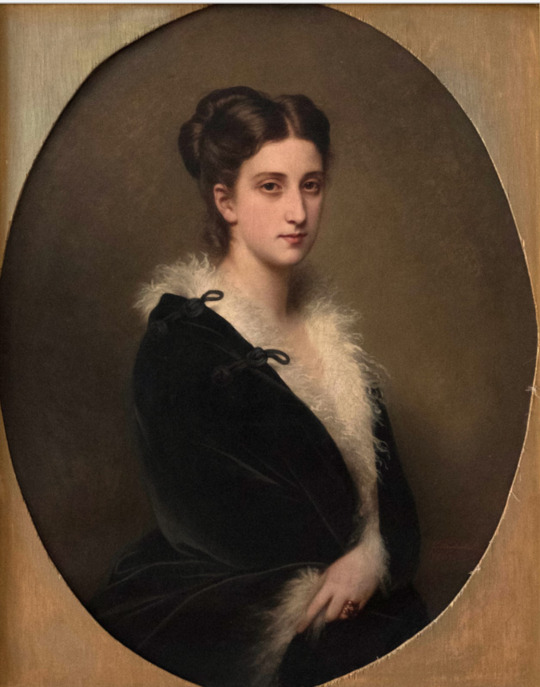
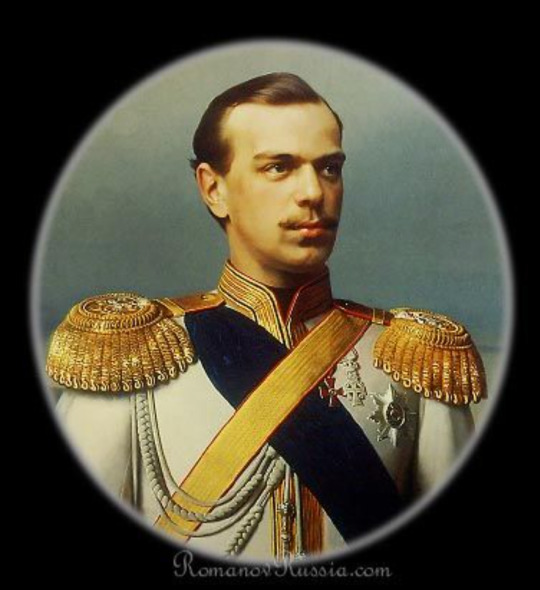
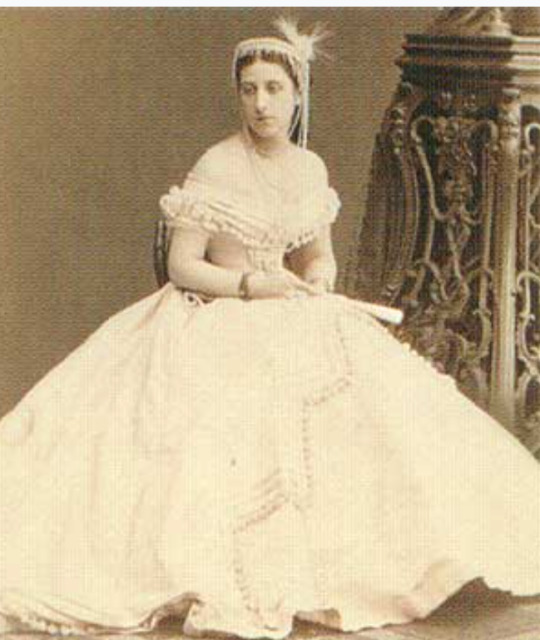





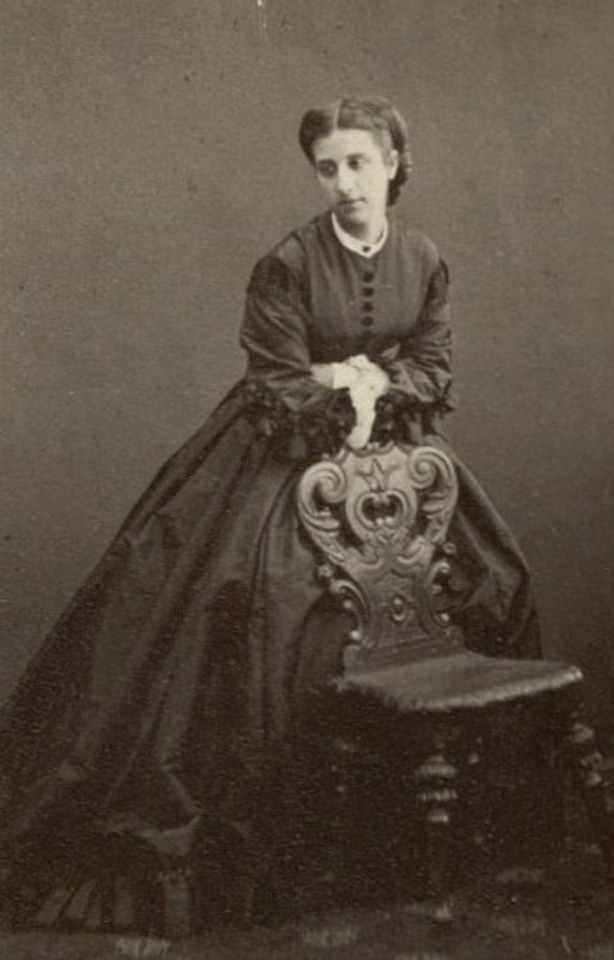

Photographs: 1. Portrait of Princess Maria Elimovna Meshcherskaya; 2. Miniature of young Tsarevich Alexander Alexandrovich; 3. Sasha; 4. Maria; 5. Another beautiful photograph of Maria; 6. Maria with her aunt; 7. Maria on horseback in a riding outfit; 8. Another photo of Maria; 9. Maria and her husband, Paul Demidov (often spelled Demidoff), Prince of San Donato (apparently, the marriage was not arranged).
Alexander III's first love (it was not Dagmar)
The portrait of Alexander III that has come down to us through history is undoubtedly flat. It tells us that he was a good, faithful husband, a devoted father, and a champion of autocracy. Yes, he had a temper; no, he did not like to dance; he preferred to drink with the boys. He was respected enough by his family that he could keep it in order. Unfortunately, he died too young.
His diaries at the State Archives of the Russian Federation tell a different story. I don't know if the diaries are complete. Authorities found three missing notebooks in 2015. Here and there, you can find comments by authors and scholars alluding to the fact that his entries show a degree of emotional depth that surprises all. It is through these diaries that we learn about Sasha's first love, Princess Maria Elimovna Meshcherskaya (1844-1868), daughter of Prince Elim Petrovich Meschersky (1808-1844), Chamberlain of the Imperial Court and a poet; her life was quite short and tragic.
According to those who knew her (such as Count Serge D. Sheremetiev and Countess Kleinmichel), she was one of the prettiest young women in St. Petersburg. She had brown hair and large black eyes. The young woman was an orphan from an early age, and her aunt Princess Baryatinskaya brought her up. One source says she met young Grand Duke Alexander at a costume ball (she looked stunning in an Egyptian costume.) Regardless, they often met at Court, as the princess was Maid of Honour to Empress Maria Alexandrovna, and they fell in love. At that time, Alexander was not Heir to the throne and might have harbored hopes to marry her. But, in 1865, his beloved brother, Tsarevich Nicholas, died, and with his death, all possibilities of Alexander marrying Maria disappeared. As Tsarevich and future Emperor of Russia, Alexander knew he had to marry someone of royal blood.
Alexander's brother Nicholas had been engaged to young Princess Dagmar of Denmark. For political reasons, both royal houses still wanted an alliance between them to take place. A trip to Denmark was planned for the new Tsarevich only a few months after Nicholas's death. Sacha understood what this meant. A plan to have him marry his brother's fiance was afoot. He felt torn between his duty to his father and country and his love for Maria Meshcherskaya. He also felt unprepared to become Emperor and thought of renouncing his position as Heir, which would leave him free to marry Maria. He tried to avoid seeing her. On June 25, 1865, he wrote in his diary that this was difficult as they used to see each other twice daily. However, he was thinking more and more about Dagmar and felt the need to have a wife (meaning Dagmar). But soon, his determination wavered; he continued to see Maria, and his love for her deepened through the summer and autumn of 1865. On March 23, 1866, however, he wrote in his journal, "I will say goodbye to M.E., whom I loved as I have loved no one before."
But two months later, he, once more, had a change of heart. As a trip to Denmark was imminent, he wrote, "I grew to love her (M.E.) even more fervently, strongly, passionately. Now I am only trying to escape this difficult situation and, if possible, to marry sweet M.E. I want to refuse to marry Dagmar, whom I cannot and don't want to love." When Alexander II confronted his son with stories about him and Maria Mescherskaya (a story had made it to the Danish papers about the Tsarevich not wanting to marry their princess because of his affection for another woman), the Tsarevich answered that he could not go to Denmark and did not want to marry Dagmar. The Emperor gave him 24 hours to reconsider. The next day Alexander II again asked his son about the Danish wedding: Sasha replied that he did not feel he could love Dagmar and added that he had decided to renounce his position as Heir because he did not feel he could do a proper job. Alexander II got quite angry, talked about duty, and ordered his son to go to Denmark, adding he would send Princess Mescherskaya away. Alexander obeyed his father, went to Copenhagen, and proposed to Princess Dagmar. And as they say, the rest is history. The marriage of two people who had started loving others (Dagmar had loved Nixa, and Alexander had loved Maria.) turned out to be very loving and successful.
Alexander II did ask Princess Mescherskaya to leave Court immediately. Young Sasha had pleaded with his mother that the young woman not be punished. She went abroad with her aunt and settled in Paris, where she met a Russian diplomat, Paul Demidov (often spelled Demidoff), Prince of San Donato, and married him. Demidov was one of the most eligible bachelors of his time, having inherited one of the largest fortunes in Russia! The couple lived abroad. Sadly enough, Maria died in 1868 after giving birth to a son she would not live to see grow up. Her husband, who later married again, grieved her death long and deeply. (gcl)
#Alexander III#Alexander II#Princess Dagmar of Denmark#Empress Maria Feodorovna#Empress Maria Alexandrovna#Princess Maria Mescherskaya#Paul Demidov#imperial russia#romanov dynasty
14 notes
·
View notes
Note
Hey, it's me again. Since your ask box is rarely open (I'm assuming to avoid trolls and idiots spamming you with nonsense), I feel there's a new problem with bigotry. It's very important.
Since Oppenheimer came out there's been discourse on if Hiroshima and Nagasaki were okay or not. Sadly too many dummies are out here saying they deserved it.
Here's some of the stuff they say as to "why"
"It stopped the war/Japan didn't surrender/An invasion would have been worse": This one I'm not gonna say is right or wrong because official sources and historians debating on these things still so whether you believe that is up to you.
THE BIG ONE I AM SICK OF: Using Japan's wrongdoings as a whataboutism dogwhistle. I'm sick of seeing people be like "But Pearl Harbor/Nanking Massacre/Southeast Asia invasions/Unit 731/Torture!". I get it, those were all awful, but the fact that you justify killing random strangers based on the actions of their military and government, when THEY'RE the actual ones at fault, is stupid and racist. They do this with Russians too and occasionally Chinese people. For them "Dictator = everyone" when it comes to dictatorships (the only one they can tell the difference with is North Korea, any other dictatorship, NOPE!)
To add to the point, many people (Americans and Southeast Asians) forget that America has been menacing them for, like, ever! Ever heard of the My Lai massacre? Just like Nanking, Americans slaughtered and r*ped Vietnamese people. The Pearl Harbor idiots forget that America literally bombed Laos and Cambodia, MULTIPLE TIMES. Filipinos still worship Americans as if America didn't actually bomb Manila when there in WW2 to target the Japanese, yet killed WAY MORE FILIPINOS IN THE PROCESS AND THE FILIPINOS THINK THE AMERICANS "SAVED THEM FROM THE WICKED JAPS". Everyone is rightfully mad that the government has "not said sorry" (they have multiple times but they were hollow because the government is very fringe and they try and make that stuff seem okay and don't tell the whole truth in schools), but nobody is mad or racist towards Italians, nobody seems to care that Italy never apologized for their actions, even the countries victimized by Italy. Even during the war nobody really cared. Despite the fact that Italy also has a very fringe government now and Mussolini's GRADDAUGHTER is in one of the parties and is a simp for her grandpa.
The worst part of all of this, I've seen critics of the bomb and surviviors actually harassed and cyberbullied by Japanophobes. Here's some of the examples: There's a trend of people calling Japanese people who don't like Barbenheimer "nationalists", "tankies", "Japanese imperialism apologists", etc, who "need to cope/get a life/cry about it", and they don't have even mercy on CHILDREN. I saw a quote from a survivor someone shared that was a father talking about watching his son die slowly in front of him. And guess what, some Filipino came along and was like "WHAT ABOUT ALL THE FILIPINO KIDS THE JAPANESE KILLED?!", and my mind was literally BLOWN. Look, that was awful, I get it. But I have no respect for you. The NERVE of you to make it about yourself. This isn't ABOUT Japan vs. the Philippines. THIS IS ABOUT AMERICA VS JAPAN. Go complain on a post about the Philippines. This is a PARENT and his SON who may I say, was 4. Yes, 4. And this fool essentially said "This 4 YEAR OLD is a soldier responsible for the deaths of my people's children!". Dude, the children had nothing to do with it. I don't support defending anyone's war crimes and that includes America, but at least those were adults. CHILDREN can't even process anything that's happening and you're mad at THEM?
America and its simps really need to stop thinking they're good nd that they can't commit war crimes. They wanted to get revenge and kill as many people as possible. They wanted to show off to Russia. They literally had internment camps for the Japanese PEOPLE which has even less excusable reasons and merit than the bombs. There's nothing else to it and no matter if worse could have happened, there's no justifying the killing civilians and children part. These fools are mad at the wrong people.
On the bright side, a lot of the people who used the first point are actually willing to admit that they killed random people and that they wished it didn't happen. And I respect those people because they actually can tell the difference or still recognize Japanese criticism and Japanese survivors and deaths were not just "tankies getting what they deserved".
Look up my reblogs for more info, and check Twitter and Youtube comments under Oppenheimer criticism videos and you'll see the racists in all their glory.
So yeah, if people like Oppenheimer that's fine, it apparently isn't trying to make the bomb seem okay, but the criticism has attracted dumbasses making fools of themselves. And people should watch movies like Barefoot Gen, Godzilla, Tora Tora Tora, and Grave of the Fireflies after for some blatantly and UNBIASED takes from Japanese people, rather than American "Icky Japanese Tankie" movies.
Honestly that whole discourse is a fucking mess rn, I ain't even touching it with a 20 ft pole
2 notes
·
View notes
Text
Yesterday was the first time I encountered the name of Janet Sobel, an Ukrainian American female artist who influenced Jackson Pollock. Under the cut are the notes I took while trying to learn more about her.
Naturally, the first thing I did was to look her up on Wikipedia. The only color example of her art in the article was this:

My first thought was "This looks like Marc Chagall!"
The second: "They lived at the same time. I wonder if both of them were drawing from the same tradition. Was she also Jewish?"
Wikipedia said the following (direct quotes):
Janet Sobel was born as Jennie Olechovsky in 1893 in Katerynoslav, Russian Empire (now Dnipro, Ukraine).
Her father, Baruch Olechovsky, was killed in a Russian pogrom.
Her depiction of soldiers with cannons and imperial armies, as well as traditional Jewish families, reflected the experiences of her childhood. Her figures often demonstrated the time of the Holocaust, where she relived the trauma of her youth.
And that might already be clear enough for some readers including myself, but for an unknown reason the article doesn't directly call the artist Jewish. For example, Chagall's page is in the "Jewish painters" category, but hers isn't.
So I returned to the google search results... And literally the next English-language biographical article said this in the blurb, without even the need to open the link: "She was born Jennie Lechovsky in 1893, to a Jewish family". Is there, like... a reason Wikipedia decided not to say it directly?...
Anyway, turns out, Sobel and Chagall actually met while he was in America!
Another artist whom Sobel met at this time was her near-contemporary Marc Chagall, with whom she shared Russian culture and language and a love of music. When Sol took her to visit Chagall in his studio, he recalls that the two spoke Russian together (rather than Yiddish, another language that they had in common). Chagall had only landed in New York on June 23, 1941, the very same day the Nazis invaded Russia. During the seven years he remained in the United States, he never tried to learn English, provoking one biographer to quip: "The longer he stayed in America, the more Russian he became." At the time of their meeting, both Chagall and Sobel were preoccupied by accounts of the war raging on the Eastern Front, the land of their youth, and both were feeling profoundly Jewish. Chagall's memories of his native Vitebsk included his uncle teaching him to play the violin, and, as a result, he liked to listen to music all day long while he worked. This habit was not so different from Sobel's who commented: "I always read books, the Russians and the English, and I love music…. I don't think that ever I would paint a picture without music to listen to. All humans must have something like that, that warms them inside."
(source)
The same article also points out some Ukrainian and Jewish motifs and references in Sobel's art, as well as a few more reproductions of her art. Even so, my cursory search didn't explain the similarity with Chagall's style I felt in the picture above — the big floating face, the way the colors are placed. Surely it wasn't just my imagination! Needs further research. Maybe she was inspired by his art directly, instead of both of them independently having similar influences?..
Here are some other quotes, mostly concerning the way this Jewish Ukrainian immigrant grandmother, unsurprisingly, faded into obscurity. Turns out that in addition to the obvious reasons, there were some unfortunate coincidence involved, including a paint allergy (details in the links).
But Sobel’s fame did not last long. The news media often referred to her as a grandmother and housewife first, then as an artist, said Sandra Zalman, an associate professor of modern and contemporary art at the University of Houston.
“Sobel did not fit into the categories that the art world conceived of her,” Zalman said in a phone interview. “She got attention for being an outsider, but then is quickly forgotten for being an outsider.”
Pollock, for instance, was the quintessential American artist. Dressed all in black, he would crouch or stand over a canvas while athletically flinging paint, a cigarette hanging from his mouth. Sobel, on the other hand, would lie on her stomach on the floor of her apartment in her high heels and stockings, passively watching the paint fall onto her canvas from the bristles of a brush.
“It is not easy to paint,” she told The Brooklyn Daily Eagle. “It is very strenuous. But it’s something you’ve got to do if you have the urge.”
Some art critics dismissed her creations as “untrained” or “primitive.” Sobel’s skills, Zalman said, were not a threat to Pollock; her influence was merely a place holder for his fame.
(source)
---
Pollock's was an instinctive, shoot-from-the-hip technique that didn't painstakingly plot its next move – rather, one that grabs a bottle, takes a swig, wipes its lips on its cracked knuckles, and couldn't care less who's watching. This is painting free from form and formalities, the kind of painting that only an American, a real American, could invent.
Only it wasn't. Contrary to established myth – a myth accelerated by sensational spreads in Time and Life magazines in 1949 and 1956 under such eyebrow-raising headlines as "Jack the Dripper" and "Is he the greatest living painter in the United States?" – Pollock's "signature" style wasn't his invention at all, but the brainchild of another artist, one whose extraordinary story confounds and invigorates our understanding of one of the most celebrated contours in recent cultural history. Put simply, modern art has a problem. Her name is Janet Sobel. (...)
Writing years later in 1955, the art critic Clement Greenberg admitted to visiting the exhibition with Pollock and that the two "noticed one or two curious paintings shown at Peggy Guggenheim's by a 'primitive' painter, Janet Sobel (who was, and still is, a housewife living in Brooklyn)". Putting to one side Greenberg's derisory instinct to belittle the status and achievement of Sobel ("curious", "primitive", "housewife"), what he goes on to acknowledge places beyond doubt the enduring significance of the encounter: 'Pollock (and I myself) admired these pictures rather furtively… The effect – and it was the first really 'all-over' one that I had ever seen… – was strangely pleasing. Later on, Pollock admitted that these pictures had made an impression on him."
Why "furtively"? It is, after all, a word that admits a level of guilt and secrecy to the act of looking. Despite Pollock's own admission that Sobel's work "had made an impression on him", Greenberg can't resist diminishing the magnitude of that acknowledged impact. Greenberg goes on to insist that when Pollock "began working consistently with skeins and splotches of enamel paint, the very first results he got had a boldness and breadth unparalleled by anything seen" in the work of any previous painter, including Sobel. "Even as he selects Sobel as Pollock's predecessor," notes the art historian Sandra Zalman, "Greenberg asserts that Pollock had already surpassed her."
(source)
---
What seems to me even more important for understanding Janet Sobel’s motives for making art and possibly for explaining, in part, why the New York art world abruptly forgot her work is contained in her statement that she sent to Porter for the catalog of A Painting Prophecy, 1950: “I am interested in people and everything that pertains to them.” Her statement is short, succinct, and humanistic, but in it, Sobel unfortunately, does not identify herself as a visual artist, and so the statement differentiates her profoundly from the artistic and intellectual ambitions expressed in the statements of the exhibition’s twenty-one other artists, who included Robert Motherwell, Stuart Davis, William Baziotes, Adolph Gottlieb, Jackson Pollack [sic], Louise Bourgeois, I. Rice Pereira, Jimmy Ernst, and Mark Rothko. Sobel’s statement, however, shows a remarkable congruance with the humanistic title of a book that first appeared in 1952, Life Is with People: The Culture of the Shtetl, which Barbara Kirshenblatt-Gimblett, a New York University professor, writes “was the first major anthropological study of East European Jewish culture in the English language.” In contrast to others, I would even argue that Janet Sobel’s fame in the early and mid-1940s came about because she was a woman, especially one whose very homey domesticity was so different from the public’s ideas of what the typical avant-garde artists then coming to prominence—like Jackson Pollock—were like. It may also be true that during World War II, when American men were more likely to be serving in the armed forces and overseas, it was easier for a woman to receive recognition for working in a factory or as an artist and doing a “man’s job.” Beyond her work’s artistic qualities, the press was intrigued that so conventional a woman—a matronly, plump, unpretentious, middle-aged, middle-class Jewish Brooklyn mother of five, a grandmother, a housewife, who had no art training and who had begun to make art only in the past five or six years—was so gifted and original an artist. However, Sobel never had to seek out the interest and support of members of the New York art world and cultural hierarchy on her own; she was very fortunate that her son Sol so energetically showed his mother’s artworks to his own art teachers and to prominent individuals like Sidney Janis, who at the time was known as a collector and art writer and had not yet opened his gallery; and to the philosopher and educator John Dewey.
(source)
---
But despite that critical acknowledgment, Sobel was soon forgotten by the New York art scene. In 1946, She would move to Plainfield, New Jersey, where she was effectively cut off from her contacts in New York. She would continue to paint into the 1960s and exhibit her works locally.
Her sudden obscurity was also the result of the critical consternation that followed Sobel.
“Sobel’s work did not fit easily into any of the categories of the burgeoning 1940s New York art world or alternately it slid into too many of those categories. Sobel was part folk artist, Surrealist, and Abstract Expressionist, but critics found it easiest to call her a “primitive.” Greenberg’s endorsement functions ambivalently it lends credence to Sobel’s aesthetic accomplishments but safely sequesters her work,” wrote art historian and professor Sandra Zalman in an essay on Sobel’s work.
Dealer Gary Snyder has been an advocate of Sobel’s work for decades, first seeing it in the exhibition “Abstract Expressionism: Other Dimensions” at the Zimmerli Art Museum of Rutgers University in 1989. “What struck me was the quality of the work, which was equal to that of Pollock, and of the same era,” said Snyder, who organized a pivotal exhibition of Sobel’s work in 2002, the first solo show of her work since her exhibition at Guggenheim’s exhibition in 1946.
Snyder feels that, for many, Sobel simply didn’t fit with the narrative being built up around the New York School of painters so she was written out of its origin story. “Those years, the reputation of New York School of Abstract Expressionism was burgeoning with these bad boys of Jackson Pollock, and Willem de Kooning. Janet Sobel didn’t fit into that myth of powerful hard-drinking painters of big paintings. The attention went elsewhere.”
At the very end of her life, in 1966, the art historian William Rubin, then a curator at the Museum of Modern Art, would visit a bedridden Sobel while researching the work of Jackson Pollock. Rubin would there select two all-over abstractions by the artist to be brought into MoMA’s collection, one of which, Milky Way, is currently on view at the museum.
Beginning in the late 1980s, there has been a steady reappraisal of Sobel’s work, particularly in the past 15 years. Still, those conversations have largely centered on her drip paintings and their relationship to Pollock.
“Her stored experiences are what led to the spiritual, humanist, and profound nature of her art. When we visit MoMA and see The Milky Way, we realize that this is more than a painting—it is a message, to us, the viewers,” said James Brett, founder of the Gallery of Everything, London, which presented a booth devoted to Sobel’s work at Frieze Frieze Masters 2022, featuring five works seen in the background of the Ben Schnall photograph.
Today, Sobel’s oeuvre feels prescient and important for reasons well beyond exhausted conversations about the origins of Abstract Expressionism. Indeed, the folkloric qualities of her earliest paintings and her deep involvement in an American Surrealist style led largely by women feel particularly relevant to larger questions about the telling of art history. She remains quite singular in that regard.
“She’s a very unusual self-taught artist in that unlike most self-taught artists, her work evolved over time, like more Modern artists,” said Snyder. “She moves from a primitivism to a Surrealism, to a drip-style of Abstract Expressionism all within about 10 years, which is quite phenomenal growth.”
(source)
Here's a video from the MoMA showcasing one of Sobel's most famous paintings, Milky Way (1945):
youtube
While reading all this, I discovered that Pollock was married to the artist Lee Krasner, who was also from a Jewish Ukrainian family (but born in America, unlike Sobel, and her Wikipedia entry doesn't hesitate to use the word "Jewish"), and who significantly influenced his work. Isn't it interesting how a white man from a Protestant family became an icon of American modern art, while these women were forgotten for decades?
#art#janet sobel#blah blah blah#lava klanka is watching you#normally i'd contain notes like this in local files but i started to type them up on tumblr before they grew so i decided to keep them here
0 notes
Text
I've been drafting and redrafting this meta post for weeks now. It's about to be 5781 and my country that was founded on settler colonial genocide and slavery and a deeply flawed but fierce attachment to democracy might go full dictatorship in about 6 weeks and it's time for me to post this thing.
All our immortals are warriors, all have been traumatized by war. But only three of them died their first deaths as soldiers in imperial armies. This fandom has already produced gallons of meta on Nicky dealing with his shit, because Joe would not fuck with an unapologetic Crusader. But there's very rich stuff in Booker and Nile's experiences and the parallels and distinctions between them.
Nile was 11 when her dad was killed in action - that was 2005, meaning she and her dad both died in the same war that George W Bush started in very tenuous response to 9/11. Sure, Nile's dad could have died in either Iraq or Afghanistan, or in a training accident or in an off-the-books mission we won't know about for a hundred more years, but he died in the War on Terror all the same. I had to look it up to be sure because Obama "drew down" the Afghanistan war in his second term, but nope, we're still in this fucking thing that never should've happened in the first place. The US war in Afghanistan just turned 19 years old. A lot of real-life Americans have experiences like the Freemans, parents and children both dying in the same war we shouldn't be in.
I know a lot of people like Nile who join the US military not just because it's the only realistic way for them to pay for college or afford decent healthcare, but also because they have a family history of military service that's a genuine source of pride. Military service has been a way for Americans of color to be accepted by white Americans as "true Americans" - from today's Dreamers who Obama promised would earn protection from deportation by enlisting, to Filipino veterans of WW2 earning US citizenship that Congress then denied them for several decades, to slaves "earning" their freedom through service in the Union Army and in the Continental Army before it. As if freedom is a thing one should have to earn. Lots of Black Americans have the last name Freeman for lots of different escaping-slavery reasons, but it's possible that this specific reason is how Nile got her last name.
Dying in a war you know your country chose to instigate unnecessarily and that maybe you believe it shouldn't be waging is a very particular kind of trauma. It is a much deeper trauma when your military service, and your father's, and maybe generations of your ancestors', is a source of pride and access to resources for you but your sacrifice is nearly meaningless to the white supremacist system that deploys you. That kind of cognitive dissonance encourages a person to ignore their own feelings just so they can function. How do you wake up in the morning, how do you risk your life every day, how do you *kill other people* in a war that shouldn't be happening and that you shouldn't have to serve in just so that your country sees you as human?
We see Nile do her best to be a kind and well-mannered invader. Depending on your experience with US imperialism, Nile giving candy to kids and reminding her squad to be respectful is either heartwarming or very disturbing propaganda. We also see Nile clutching her cross necklace and praying. From the second Christianity arrived on this land it's been a tool of white supremacist assimilation and control, but like military service, it's a fucked-up but genuine source of pride and access to resources for many Americans whose pre-Columbian ancestors were not Christian, and it's a powerful source of comfort and resilience. This Jew who's had a lot of Spanish Inquisition nightmares would like to say for the record that it's not Jesus's fault that his big name fans are such shitty people.
Nile is a good person trying to do her best in a fucked-up world. "Her best" just radically changed. Her access to information on just how fucked up the world is has also just radically changed, because everything's so fucked up a person needs a lot of time to learn about it all and not only does she have centuries but she won't have to spend that time worrying about rent and healthcare and taxes, and because she now has Joe and Nicky and Andy's stories, and because she now has Copley's inside scoop on just what the fuck the CIA has been up to. Like, I want a fic where Copley tells Nile what was really behind the brass's decisions that led to her experiences on the ground in Afghanistan, that led to her father's death, but also I Do Not Want That.
Nile was 19 when Alicia Garza posted on Facebook that Black Lives Matter. She grew up in Chicago well before white people on Twitter were saying maybe police violence against Black people is a problem. She knows this is a deeply fucked up country, and she put on her Marine uniform and deployed with her team of mostly fellow women of color, and maybe she and Dizzy and Jay marched in the streets between deployments, maybe they texted each other when a white manarchist at a protest sneered at one of them for being a Marine. Nile's been busy surviving, and she knows some shit and she's seen some shit but she hasn't had much time to think about what it all means. Now she's got time. And Joe, Nicky, and Andy are willing to listen. (Is Copley willing to listen? I could see that going either way.)
Booker might also be willing to listen. The brilliant idea of cleaning up the rat Frenchman so that Nile can have millennia of emotional support and orgasms sent me down a Wikipedia rabbit hole, and holy shit do Booker and Nile have a lot of shared life experience as pawns of imperial wars. Obviously Booker is white and a man and that makes a very big difference. (Though G-d help me, Booker could be Jewish and France was knocking its Jews around like ping-pong balls in the 18th-19th centuries. Jewish Booker wouldn't make him any less white but it does add a shit ton of depth of common experience: military service as a way for your country to see you as a full member of society who matters, because who you are means that's not guaranteed.)
Booker was hanged for desertion from the army Napoleon sent to invade Russia as part of his quest to control all of Europe. We learn in the comics / this YouTube video that Booker was on his way to prison for forgery when he was offered military service instead of jail time. While we don't know how he felt about the choice beyond that he did choose soldier over inmate, it's unlikely he thought invading Russia was a great idea, given he tried to desert because Napoleon like a true imperialist dumbass didn't plan for how he was going to feed his army or keep them from freezing to death in fucking Russian winter.
I find it very interesting that the French Empire was at its largest right before invading Russia and fell apart completely within a few years. My country has been falling the fuck apart for a while now - see aforementioned War on Terror, growing extremes of economic stratification in the richest country in the world, abject refusal to meaningfully deal with climate change that US-based corporations hold the lion's share of blame for - but between Trump's abject refusal to meaningfully deal with the coronavirus and strong likelihood that he'll refuse to leave office even if a certain pathetic moderate I will hold my nose and vote for does manage to earn a majority of votes, ~y~i~k~e~s.
Our only immortals who have never known a world before modernity and nationalism happen to have been born of wars that were the beginning of the end for the imperialist democracies that raised them, and I think in the centuries to come that's going to give them some very interesting shit to talk about.
Nile's a Young Millennial, a digital native born in the United States after the collapse of the USSR left her country as the world's only superpower. She's used to a pace of technological change that human brains are not evolved to handle.
Napoleon trying to make all of Europe into the French Empire was a leading cause of the growth of European nationalism and the establishment of liberal democracies both in Europe and in many places that Europeans had colonized. Booker's first war produced the only geopolitical world order Nile has ever known and I just have so many feelings ok. Nile the art history nerd is probably not aware of this, and why would she be? This humble meta author is, like Nile, a product of US public schools, and all they taught me about world history was Ancient Greece/Rome/Egypt/Mesopotamia and then World War 2. Being raised in The World's Only Superpower is WEIRD.
Nile the Young Millennial is used to the devastating volume of bad news the internet makes possible. But she has absolutely no concept of a world where the United States of America is not The World's Only Superpower. In order to get up in the morning and put on her gear and point guns at civilians in Afghanistan, she can only let herself think so much about whether that American exceptionalism thing is a good idea.
She's about to spend many, many years where the only people who she can truly trust are people who are older than not only her country but the IDEA of countries.
She's got time, and she's got a lot of new information at her disposal. But there comes a point where my obsession with her friendship and eventual very hot sex life with Booker just isn't about sex at all. Nile needs someone to talk to about the United States who Gets It. Booker the rat Frenchman coerced into Napoleon's army, and Copley the Black dual citizen of the US and UK who's retired from a CIA career that he half understands as deeply problematic but half still believes in hence his mind-bogglingly stupid partnership with Merrick, are the only people on the planet Nile can talk to honestly about, and really be understood in, all the thoughts and feelings and fears and hopes of her experience as a US Marine.
And one more thing before I go get ready for Rosh Hashanah: Orientalism was a defining element of the Crusades and that legacy is painfully clear in current US-led Western military activity in Afghanistan, Syria, Israel/Palestine, you name it. Turns out memoirs by French veterans of the Napoleonic Wars are full of Orientalist language about Russia as well. I am maybe/definitely writing a fic where Booker spends his exile reading critical race theory and decolonial feminism and trauma studies monographs because he can't be honest with a therapist but maybe he can heal this way and become the team therapist his own damn self. I just really need him to read Edward Said and Gloria Anzaldúa and then go down on Nile, ok?
#nile freeman#tog meta#book of nile#sebastien le livre#the old guard#mine#us imperialism#european imperialism#jewish things#antiblackness#police violence#orientalism
589 notes
·
View notes
Text
Ramblings and crazy theory time about GK chap 266 “Pinky Finger Bones”
So... with this chapter we begin digging into what happened in the past. Into what happened to Wilk... but also into what happened to Tsurumi.

He clearly stared into the abyss and the abyss stared back at him... but what’s worse is that Tsurumi became much more scary than the abyss itself.
By the way you might notice a resemblance with the quote “He who fights with monsters should look to it that he himself does not become a monster. And if you gaze long into an abyss, the abyss also gazes into you.” [‘Beyond Good and Evil’ Friedrich Nietzsche] which loosely means “When you confront evil, make sure it doesn’t influence you.”
Well, it’s clear Tsurumi not only let himself influence, he sadly became worse than the ‘monster’ he was fighting.
But let’s go with order.
The cover… is more like part of a flashback scene.
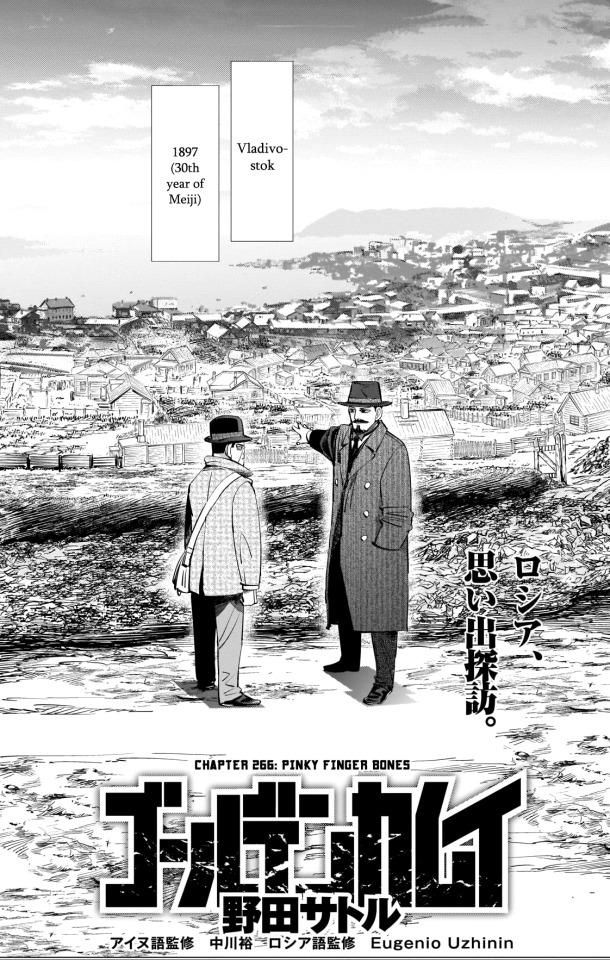
It shows Tsurumi and Tsukishima in Vladivostok, in 1897. Therefore we’re at the point in which Tsukishima was released from jail and was working as an intelligence officer with Tsurumi in Russia.
They are shown alone, but it doesn’t necessarily mean they went there alone, as Tsurumi could have other men with himself, to create a spy network. Or not.
We’ll find out only if it’s relevant to the plot so, for now, I’ll let it on hold.
Anyway Tsurumi and Tsukishima talk of how, since Vladivostok is the only Russian port that doesn’t freeze and can be used all year round, it’s a strategically vital point for Russia but also for Japan. Central had made appoint to let Tsurumi know they need to conquer it if they go at war with Russia.
At that point a Russian man spot Tsukishima and starts asking him if he is Japanese and knows a man named Hasegawa who disappeared without a trace 6 years ago.
As Tsukishima struggles to understand what he says (he’s clearly not well versed in Russian yet) the man talks about the bodies of Hasegawa’s wife and daughter, but we don’t get to hear what he says about them.
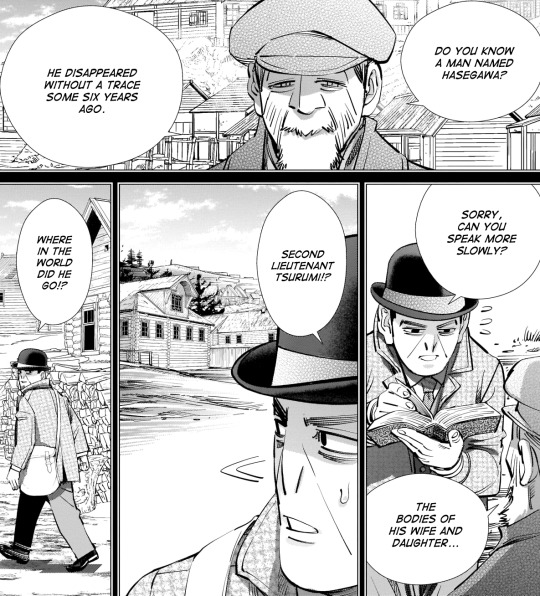
Tsukishima turns to discover Tsurumi has disappeared and, searching him, he finds him in front of Hasegawa’s burned photo studio.
Tsurumi’s expression, which Tsukishima can’t see, is interesting. His eyes are shadowed by the brim of his hat (while Tsukishima aren’t) and his eyes are stretched thin, many stress lines under them.
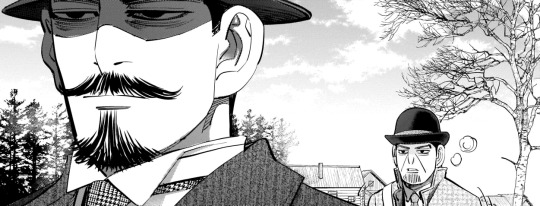
He’s probably lost in painful memories, which are likely now wrapped by the hate he feels for who caused his tragedy.
When Tsukishima reads on the sign ‘Hasegawa photo studio’, he realizes it’s the name the Russian was talking about. I’ll be honest, the coincidence is a little too forced. I mean, to have a random Russian guy asks to a random Japanese (let’s remember Vladivostok HAD a Japanese district so Japanese people is not that impossible to spot there) if they knew Hasegawa who disappeared 6 years ago and, COINCIDENTALLY, this Japanese is with the guy who, in the past, was Hasegawa, a guy who apparently doesn’t hear the question and marches straight to Hasegawa photo studio (they weren’t that close, Tsukishima lost sight of Tsurumi and had to search for him) so that Tsukishima can connect some dots back then and a lot more in the present is... well, way too providential.
It would be different if that Russian had a reason to check all the Japanese he were to spot and had done so for 6 years but no reason is given. We aren’t told he was Fina’s relative (Fina has a family to whom she was supposed to return the day she died)... and therefore pretty invested in the tragedy and it’s clear he’s not part of the secret police or he wouldn’t give Tsukishima random details. Tsukishima isn’t even standing near Hasegawa’s house at the time he was questioned, so it was possible to speculate they knew each other.
That guy who spoke with Tsukishima was just a Russian who woke up that morning and decided, spotting some Japanese, to ask him about a guy who disappeared 6 years ago for... no apparent reason beyond plot convenience.
But okay, let’s go on.
We’ve left Tsukishima connecting the photo studio with the guy the Russian mentioned, relying to Tsurumi the Russian guy mentioned ‘something’ about that man’s wife and daughter.
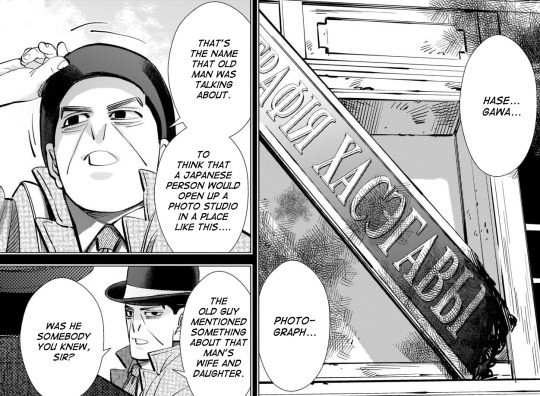
At this point I wonder if there’s a reason why we aren’t told what that something is. I would think that the fact that their bodies got burned up in the fire wasn’t something to discuss or wonder about but maybe... there’s more?
I don’t know.
Anyway Tsukishima wonders if Tsurumi knew Hasegawa, which really, seems logical enough as Tsurumi came there to watch his burned shop and Tsurumi denies it, saying there’s plenty of Japanese people in Vladivostok (which again make weird how the Russian guy asked them if they knew about Hasegawa). Tsurumi then claims Hasegawa should have been odd for wanting to open a shop away from the Japanese district, his eyes hidden by the brim of his hat and I facepalm here because he’s basically lampshading that Hasegawa had to be a spy for wanting to do so...

which seems uncharacteristically careless from him... unless he wanted Tsukishima to actually question him further... to push him to talk because maybe he too needed to talk but couldn’t... but Tsukishima is evidently ignorant in spy matters so he doesn’t get the hint.
He doesn’t lot go though, as Tsukishima remembers Hasegawa was Tsurumi’s mother’s maiden name, whom he noticed when Tsurumi went to pay his respect to her grave.
Tsurumi compliments for Tsukishima’s good memory and deflects Tsukishima’s suspicions saying it’s a common name in Niigata.
So we’ve some info about Tsurumi to ponder about, like how his mother is dead and how he was an Hasegawa so there’s to wonder if he was related to the ‘Hasegawa senior’ which whom he supposedly came in Russia as a teenager.
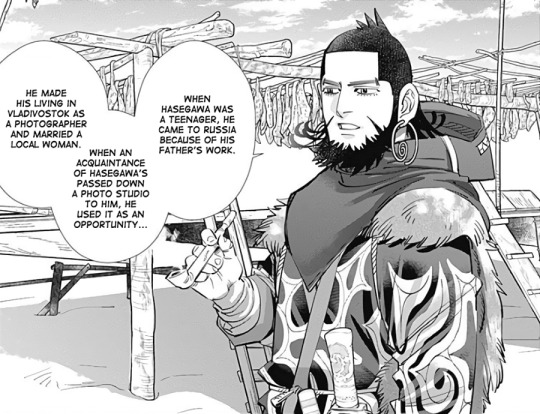
Was the guy his father using his mother’s maiden name? Or a maternal uncle? Can it be there was originally an Hasegawa Koichi and Tsurumi and him swapped (swapping identity with someone was a common spy technique)? If that’s the case was Kouichi a cousin of Tsurumi?
Or the guy never existed and it’s just a cover story? Hard to say, interesting to speculate.
Anyway we jump back to the present and to Tsukishima, a vein popping on his check, connecting the dots and realizing ‘that Hasegawa’ was actually Tsurumi.
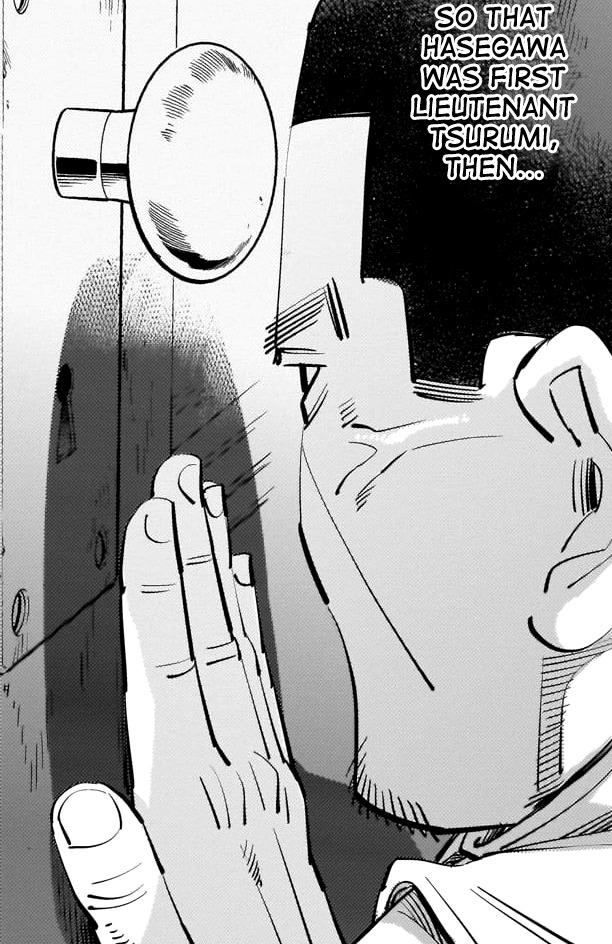
Tsurumi then goes and says that 50 years ago some of the more extremist Ainu gathered up a great quantity of gold dust and were planning something... and here I pause again.
So, does this mean whose extremists did take a part of the hidden gold? Or that they were the gold’s guardians, aware of where it was hidden?
If it happened 50 years ago, unless the gold was stolen by the hideout, this means the extremists were the same guys who knew about the hideout. So, Ariko’s father could have been one of them as well as Asirpa’s grandfather (my bet is he’s the one who knew where the gold was).
Anyway the Ainu’s plan in order to fight the shogunate was to get a captain of the imperial Russian navy to divert Russian warships, munitions and such to them... and I think Tsurumi is exaggerating matters a bit because it’s really not enough to own warships, you also need men to drive them and I’m not sure how many Ainu there were who could do it but whatever, maybe back then was easier to pilot warships and use them to go to battle... but still, I kind of feel it would be complicate for him to ‘smuggle out’ Russian warships... I mean they aren’t exactly of the size you might ‘lose track of them’.
Going on.
To explain why the Russian captain would be willing to do so, Tsurumi says it’s common among soldiers who’re stationed far from central command to do as they prefer, which is something Tsurumi is intimately familiar with as he’s doing the same in Hokkaido.
However everything ended when the ship on which was the Russian captain crashed into a passenger ship in what’s called the “Russian warship Kalevala incident” of 1867 (which is completely fictional as no such thing happened in the real world) in which both ships sunk carrying everyone on board with them.
Timeline wise 1867 is also the year in which there’s the restoration of the imperial rule, with the Boshin war starting in 1868.
According to Tsurumi, since the Ainu lost the Russian captain willing to sell them weapons they should have felt at total loss about what to do with the gold.
Tsurumi then claims Wilk came in Hokkaido to search for that gold so that this was the start of everything that happened afterward.
Asirpa asks Sofia if this means it was Tsurumi the one who taught Wilk, Kiro and Sofia Japanese.
We can’t see Sofia’s face, as she’s holding her head down, but she’s sweating and panting, thinking back to when she held little Olga.
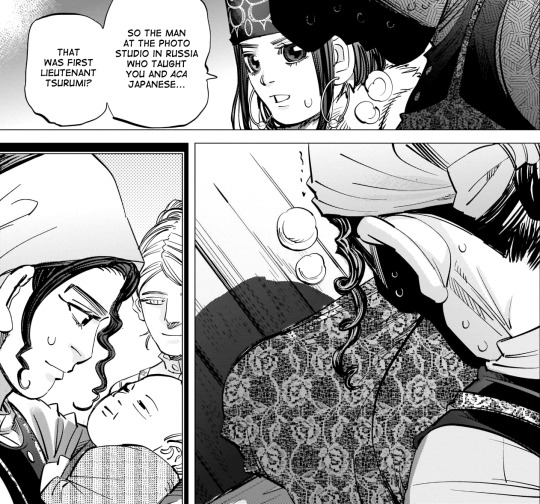
Clearly that incident of which she felt responsible still weight a lot on her, like an open wound that never healed... which in a way makes her similar to Tsurumi. Tsurumi though is trying to get revenge for that incident... while Sofia is trying to make up for it.
She then notices that Tsurumi has moved really close to her, his hand still holding the finger bones of Old and Fina, rubbing them.
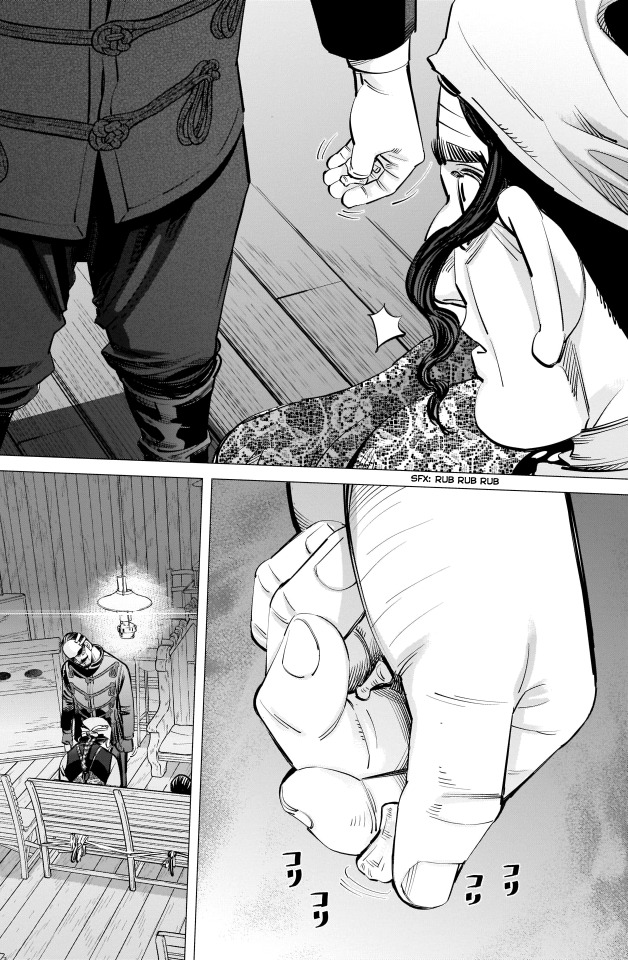
We can see Tsurumi’s head is inclined on a side, in a way that reminds me of how Usami looked at the dead horse... although Usami was tilting his head on the opposite side.
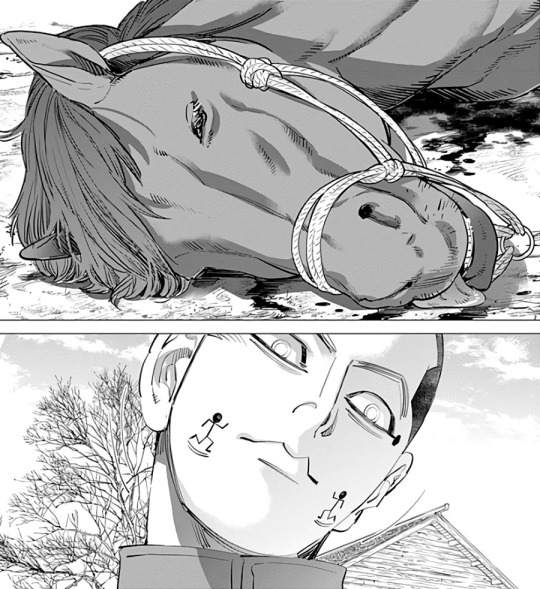
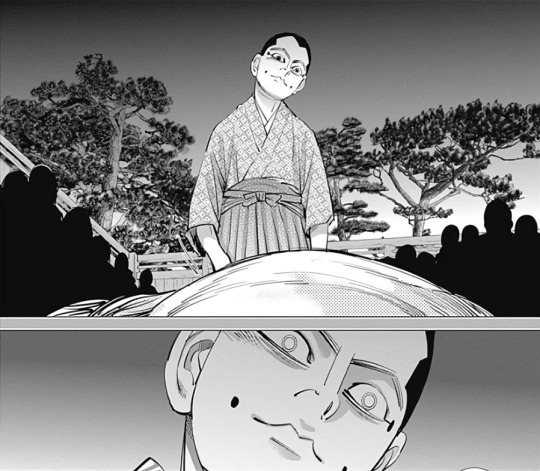
In normal body language, tilting the head on a side indicates sincere interest and curiosity... and it can fit both situations too... only Noda also makes it creepy, as if both Usami and Tsurumi were interested yet completely detached, as if they were watching something alien to them, the angle being just a little bit too much to feel natural.
Tsurumi then goes on claiming that, on the day his wife and child died, he was the only one the secret police was after and if Fina hadn’t picked up Wilk’s wanted poster she wouldn’t have come back. Tsurumi through tried to date the blame to even sooner, claiming that if Wilk and co had never gone to his photo studio, his wife and child might not have been killed.
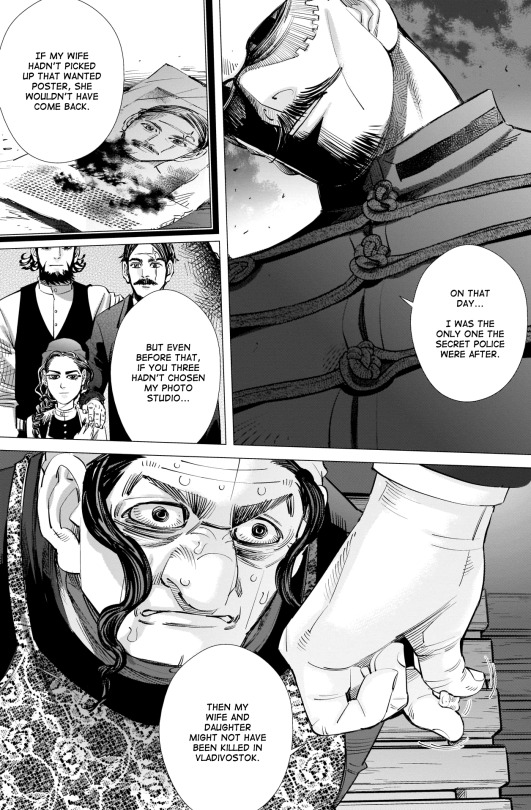
Sofia’s eyes are locked on Tsurumi’s hand rubbing that finger bone, as if she were hypnotized... and I’ll repeat what I said before.
Sofia has spent all those years after the death of Fina and Olga trying to make amends. As she believes her cause will bring benefit to the Russian people (and therefore to people like Sofia and Olga), she continued to fight for it, giving up on Wilk, the man she loved and on ‘happiness as a woman’ all to fight for her cause and atone for that innocent lives who died that day.
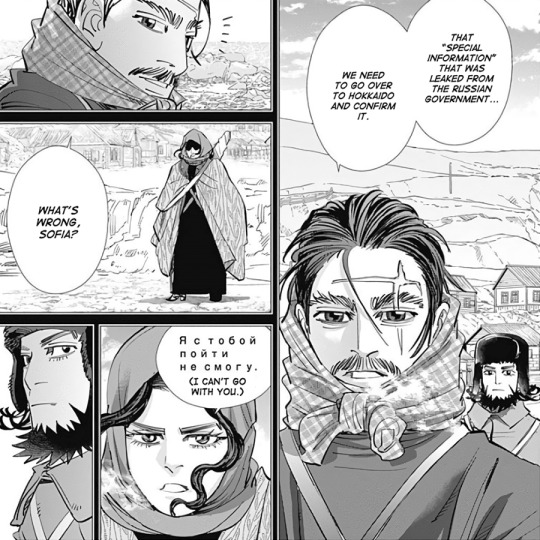
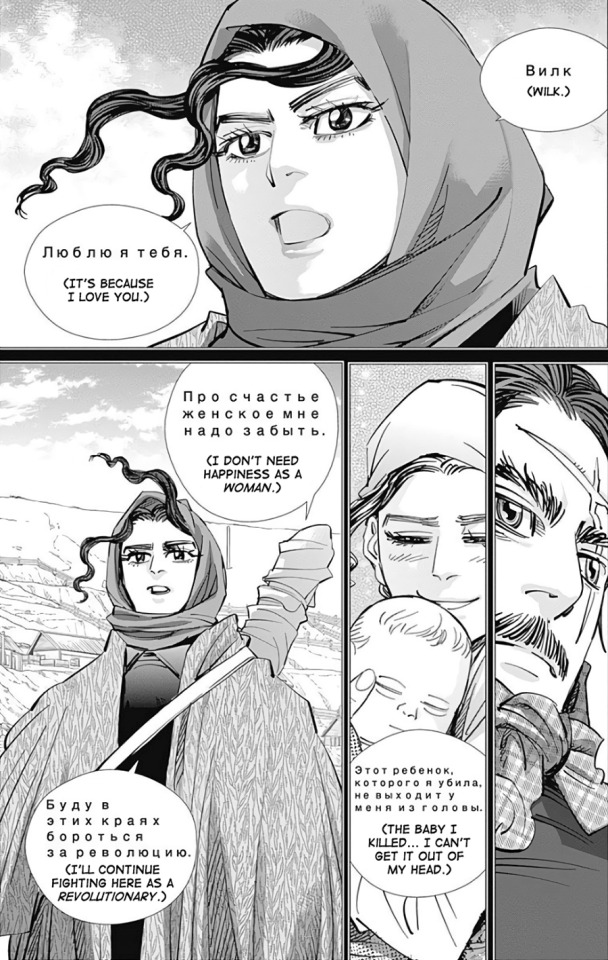
Of course meeting Hasegawa again and being blamed fully for those deaths is a big blow to her, it’s the trauma, the sin, she never overcome but tried to by doing something constructive, something she believed would be positive for the others.
It’s worth to remember Sofia came from aristocracy, she didn’t need a better Russia to live an easy life, she could have just continued being a pampered princess and instead she devoted herself to improving her country.
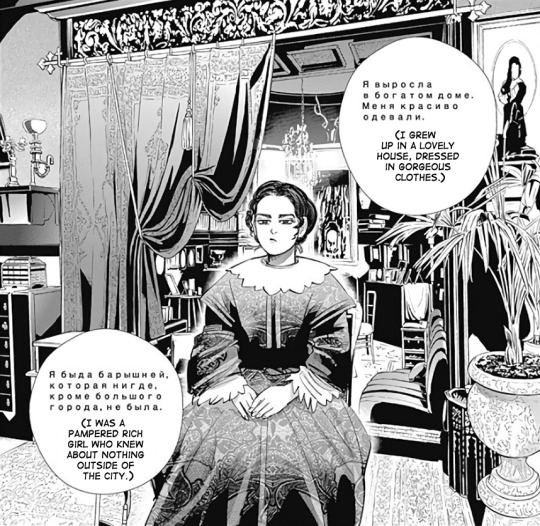
We can argue the methods she chose might not be the best, and how they put in danger innocent people, but the aim is selfless.
On the other end we’ve Tsurumi, whose family fell in disgrace... likely short after the Meiji restoration and possibly due to it.
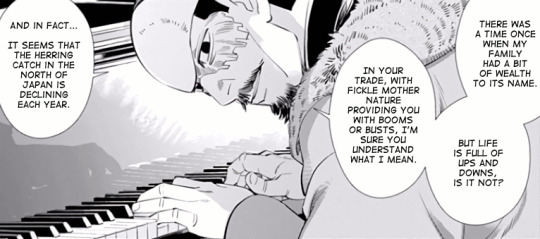
He went in Russia as a spy probably in an attempt to prove himself and improve his and his family’s life, likely married in order to have a cover but ended up falling in love with Fina and he clearly adored his daughter, Olga.
Still he continued his job as a spy even if that put in danger his own beloved family, he continued teaching Japanese to Wilk and Co even if he knew they were partisans and, ultimately, for some reasons, he get discovered by the secret police.
Somehow he finds out they’re coming from him so, instead than denouncing himself, he sends away Fina and Olga without explaining Fina nothing.
Even if she promised not to, Fina could have gone back for other reasons, it was coincidence it was just because she saw the wanted poster.
When Wilk and Co shows up at Tsurumi’s house HE LET THEM IN, before telling them they can’t come anymore. He could have denied them entrance and send them away, he could have told them he was a wanted man and the secret police was about to jump on him but no, he let them in.
When the secret police arrives he doesn’t just hand himself to them but stop to talk with them at the door, knowing inside he has three revolutionaries who will realize the police is circling the house and that will feel threatened. When they start attacking the police he doesn’t tell them the truth but let them discover it from the Russian policeman and then he hands them a machine gun so that they can fight the police.
Tsurumi was an ACTIVE cause of the incident as much as Wilk and Co if not MORE because he has something to lose and that he was exposing to risk, Fina and Olga.
Yet now he’s shifting all the blame to Wilk’s party, trying to use Sofia’s sense of guilt to get leverage on her and force her to be cooperative so that he could get the gold and get revenge over Central.
Now... I’m positive that Tsurumi suffered A LOT for the death of Fina and Olga, that it was traumatic for him... but while Sofia is trying to make up for it, Tsurumi is just trying to take revenge, trying to frame the death of his beloved ones as something that has a meaning because it becomes an helpful step in his climbing to get the gold and the control of Hokkaido.
In fact, and I’ll flash forward a bit, Tsurumi wants to know what purpose his wife and daughter served in the world, claiming they died because of Wilk and Co and therefore they should give him some sort of compensation.
In this way he uses his own loss to extort information from Sofia so that he could accomplish his goal.
Mind you, all this is a way to cope with pain that’s similar to Sekiya’s, who wanted to know why his daughter had to die, but, differently from Sekiya who was completely blameless for his child’s death, which was merely an incident he had no control over, Tsurumi was also actively to blame for his wife and child’s death and he’s trying to cope with his pain by shifting the blame on others and by trying to turn those deaths into meaningful steps on the way to his original goal, improving his own life.
Ironically, as he loved Fina and Olga, it’s unlikely reaching his original goal will bring him solace, it’s another copying mechanism to excuse himself, if he can justify his wrongdoing to them as a necessary step on the way to his goal, he believes he will feel better... which is clearly a lie. This is not the way to cope with such a traumatic event but it’s a common mistake, an attempt to dim the pain by not coping with how he’s responsible for his own loss.
I pity him for how terrible his pain should be... but there’s no turning around how his way to cope with it IS terrible in any possible way.
But let’s go back a little to Tsukishima and Koito who’re eavesdropping on the conversation.
Tsukishima remembers how, during the war they tried getting control of Vladivostok... and how Tsurumi told him they should expand the territory for Japan’s sake and that they should make certain that their comrades were sleeping in Japanese soil. Now though he (and Koito if his white irises and vein popping are to be taken as a hint) is pissed off because he fears Tsurumi’s goal is just his own personal way of mourning his wife and daughter...
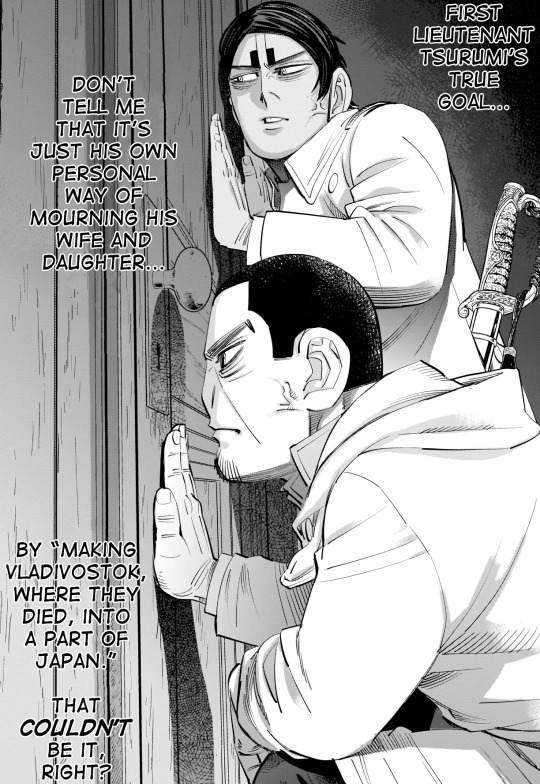
...and I facepalm again. Hard.
Now, okay, Koito can be pissed off, he made clear he uphold certain values and that he believed Tsurumi was doing it for a selfless reason only, the well being of his own soldiers, plus he had never experienced being poor so he can’t understand why people would want to be rich. He’s young, he was used and lied at but still wanted to trust Tsurumi to be more noble than he was so okay, he can be angry.
Tsukishima though was okay with tailing after Tsurumi even when he didn’t know which is true goal was...
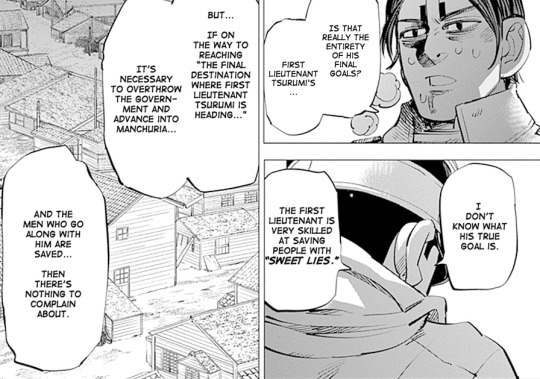
...even when he believed Tsurumi might not have a true goal...
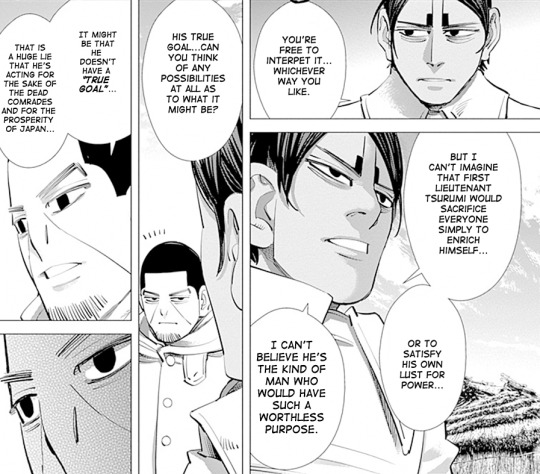
...just because he wanted to believe what Tsurumi was doing would benefit the ones following him... and now he is upset because Tsurumi had a goal... but one that was beneficial to Tsurumi? How was Tsurumi not having a goal better?
And how this change the game, really?
If Tsurumi’s actions were genuinely better for the men in the 7th, they remain beneficial regardless of Tsurumi’s ultimate goal, which isn’t meant to harm them, after all.
And just because Tsukishima decided to sacrifice his love story with Igogusa (which, Tsurumi’s lies or not, was something Tsukishima decided on his own)... well, this doesn’t mean everyone has to do the same as him.
But whatever, as anticipated before, Tsurumi used Sofia’s sense of guilt to ask her to tell him and Asirpa what happened in Hokkaido. He’s clearly talking about the Nopperabou incident and he explains he believes Sofia should know about it due to the letters she got from Kiroranke.
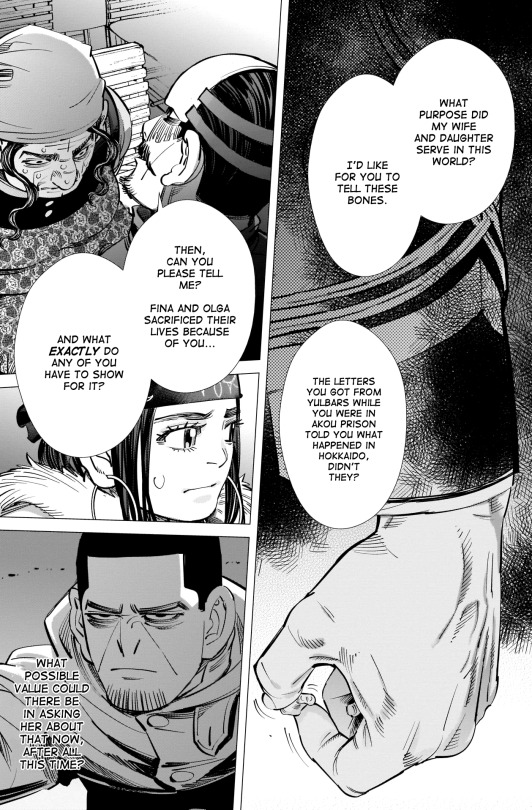
Well, the good thing in all this is that, if Tsurumi is asking her about the incident, this seems to hint that, as I speculated, he doesn’t know exactly what happened (unless he’s sure Kiro had false info which he relied her... but I doubt that’s the case).
In his anger, Tsukishima fails to understand that asking Sofia about what happened in the Nopperabou incident might:
- give Tsurumi clues about where the gold was (the incident took place when the Ainu moved the gold)
- tell him if there’s more people involved who could try to get into Tsurumi’s way
- make Asirpa feel guilty for the dead Ainu and more prone to help Tsurumi,
All this of course depending on what truly happened back then... but I think Tsurumi has some theories in this regard and he’s asking merely because he thinks Sofia’s words, which Asirpa won’t question because Sofia wouldn’t have any reason to lie, would be beneficial to him.
Sofia starts crying at all this, breaking down and admitting what we already knows, that Kiro believed ‘Wilk changed’.
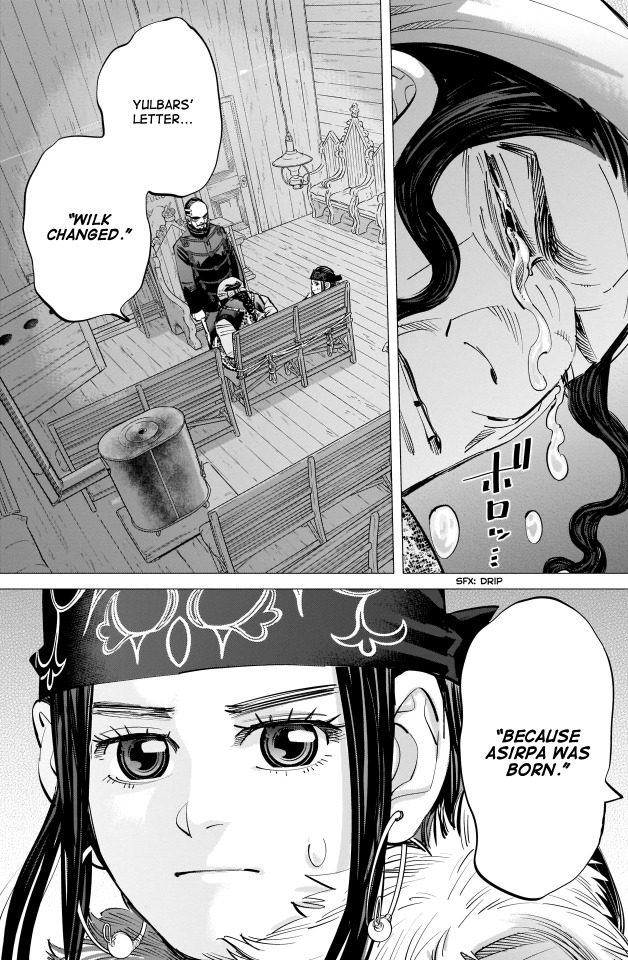
The only new addition to all this is that it confirms Kiro believed Wilk changed because Asirpa was born... but this doesn’t really tell us if Wilk changed the day Asirpa was born or later, as the change could have been gradual and we saw that Kiro seemed to have a good relationship with Wilk after Asirpa’s birth
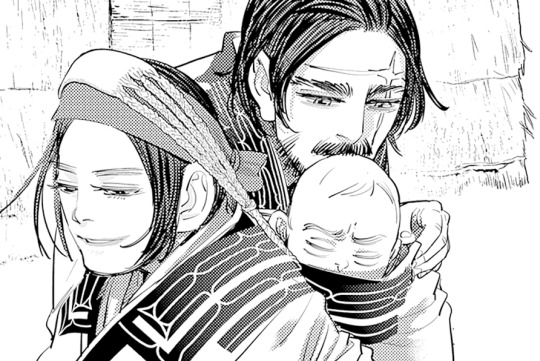
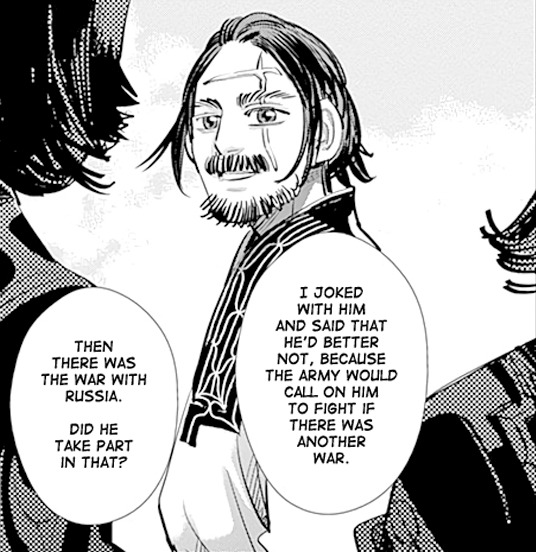
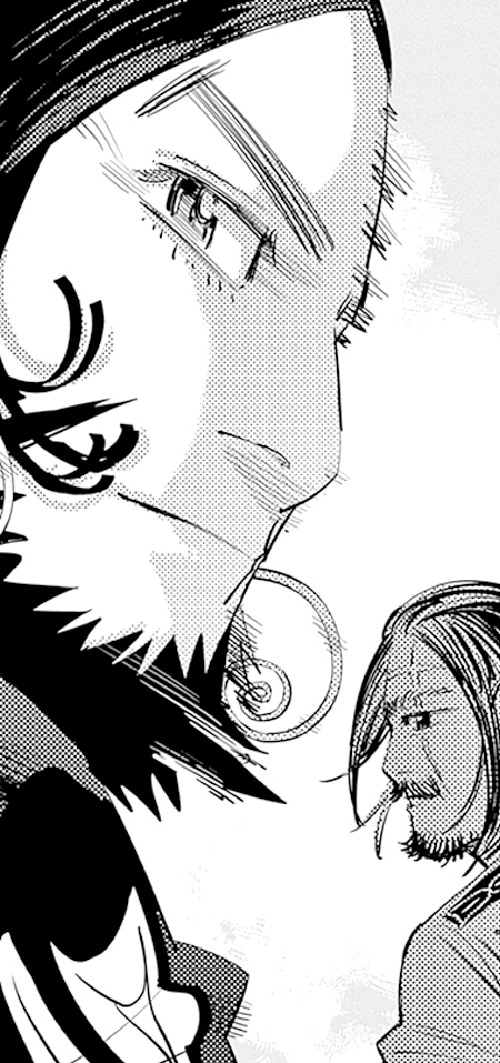
(and we know, for Wilk’s own admission, he wanted to raise Asirpa to be a guerrilla fighter capable of leading the Ainu...
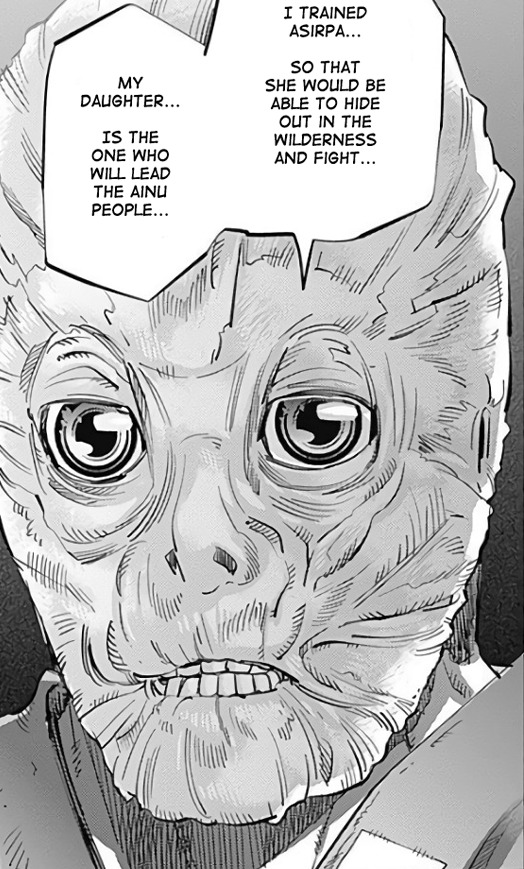
...and taught her how misplaced sympathy could become a weakness and who’s weak gets eaten, how they can’t hesitate to kill (a bear cub) for fear of being cruel or they’ll die (of starvation)).
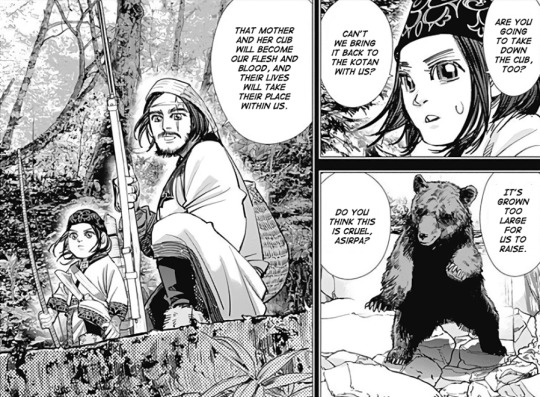
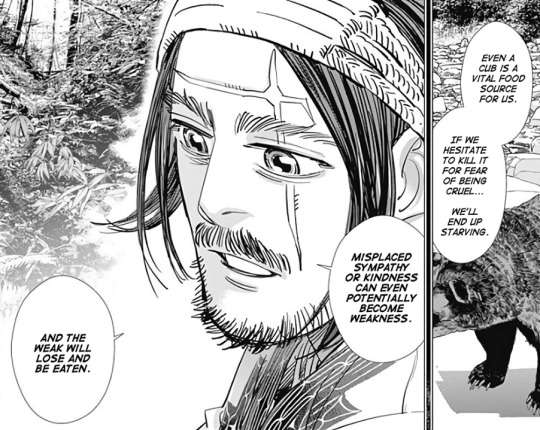
Kiro also said Wilk saw a light in Asirpa, a light of hope for the Ainu,
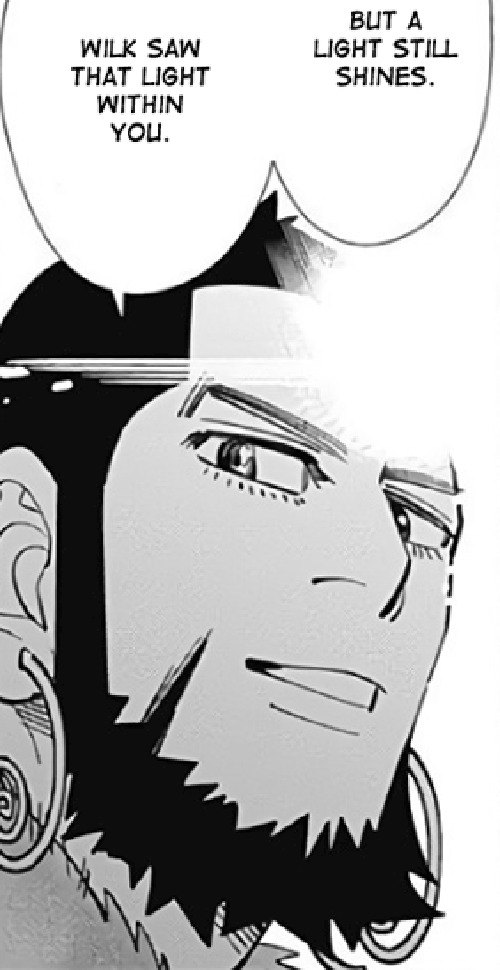
...which also fits with how Kiro himself entrusted the future to Asirpa and Sofia,
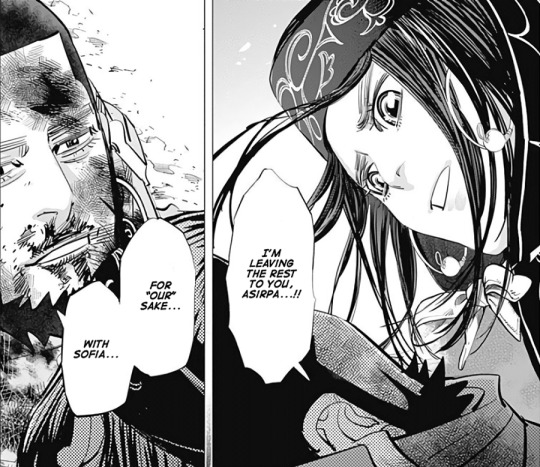
...and how Asirpa’s name means ‘future’.
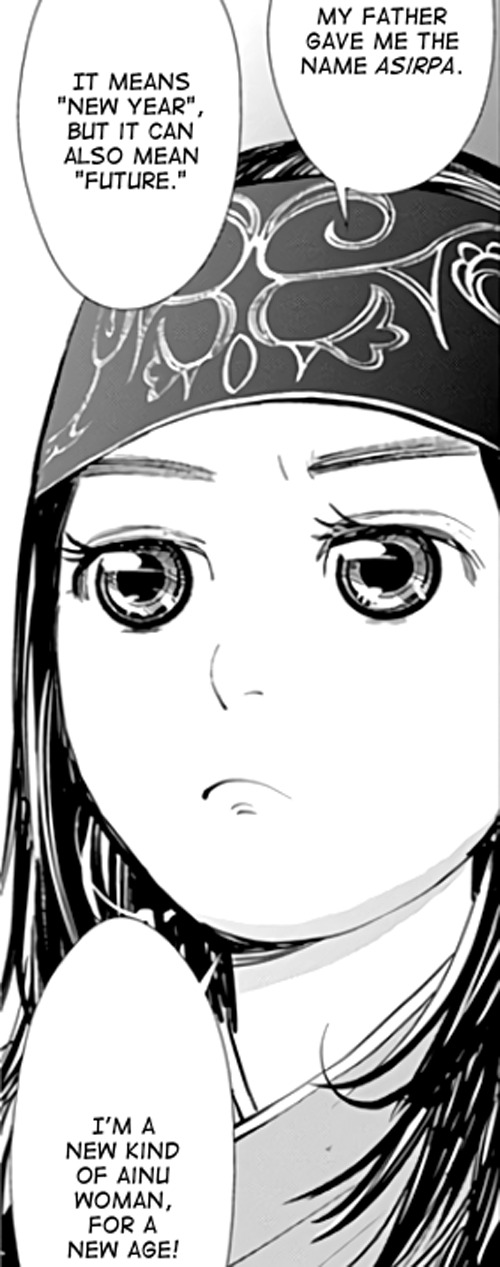
Long story short, we still don’t know anything new as it was clear Asirpa ended up affecting Wilk but how and why Kiro believed this constituted betrayal worth killing him is completely up to speculation.
I stand my ground on the fact I believe if Kiro thought Wilk had to die, it was because he believed Wilk betrayed the partisan cause, which, among partisans, has always been a crime punishable with death.
Still I genuinely doubt Asirpa’s birth caused Wilk to turn into a pro-imperialist or that it caused him to stop caring about the minorities... and since Kiro didn’t try to kill him prior to the Nopperabou incident, I’ll say the problem didn’t exactly start with Asirpa’s birth.
On the other side I don’t think Kiro is lying, he genuinely believed Wilk changed.
We’re clearly missing how Wilk changing became something that caused or was connected to the Nopperabou incident and made him worthy of being killed later, without even being questioned.
Ogata hinted that Kiro might have been afraid Wilk would reveal something about Kiro to Sugimoto...
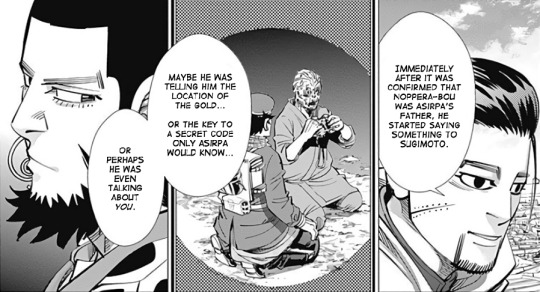
...but I somehow have troubles seeing Kiro killing all those Ainu since Kiro seemed reluctant to kill Inkarmat, who was clearly a big hindrance and didn’t want Sugimoto, who was a potential hindrance, to be shoot.
Besides Kiro clearly didn’t know where the gold was, so I’ve troubles thinking he would just murder all those Ainu without even trying to get info from them.
Could it really be possible Wilk make a 180° turn and wanted to hand the gold to the Japanese even if, apparently, when he was arrested, he was trying to escape in Karafuto with the gold so that he could bring it to his companions?
Or did he wanted to hand it to the Japanese authorities because he came to believe the Ainu, the partisans and the revolutionaries wouldn’t know how to use it to benefit their cause and would only make matter worse?
Difficult to believe so as, even if we’re to assume he decided that fighting was wrong, the gold could be used in small parts to improve Ainu’s life by buying necessities for them if times were to become harsh (just think at how the locust attack damaged Kirawus’ village food resources... if they had some gold they could have bought the missing food).
Or was Wilk trying to use it to BUY the Ainu’s freedom from the Japanese, not with weapons but with the gold itself, buying the whole Hokkaido island in Boutarou’s style, therefore betraying the Russian cause as they would remain to their own devices? It would seem an aiful naive plan from him besides it was hinted he still wanted to pursue his own dream of a far east federation for minorities by how he clung to those gold coins up till the time he was captured.
But still, we’re missing some big piece of the puzzle... which we don’t get in this chapter as the story kind of goes back a little to show us Sugimoto and Shiraishi in the bottlecar, just out of the church Sugimoto is in.
They had seen Koito get into the church, meaning they got there before Tsurumi started speaking with Sofia and Asirpa.
Shiraishi would like to rush in to rescue but Sugimoto is uncharacteristically prudent, saying Shiraishi they should go call Hijikata, because if they rush in they could be in numerical disadvantage.
Shiraishi though is worried of what Tsurumi could do to Asirpa but Sugimoto insists Tsurumi should know he can’t rely on information gotten with torture so, differently from Tsukishima, he figured out Tsurumi will try to get information from her of her own free will slowly.
Shiraishi is still worried and references how Tsurumi behaved oddly in the volume version of what happened in Karafuto (because in the magazine version the poor guy actually acted in a pretty normal way) then notices Sugimoto is actually wishing badly he could rush in and decides Sugimoto might be right.
Honestly I should give kudos to Sugimoto for managing to figure this out. From after Tsurumi got his hands on Asirpa he had been uncharacteristically smart, analyzing his opponent (Tsurumi) and understanding his moves, from how Tsurumi wouldn’t part with Asirpa to how he wouldn’t torture her but try to get info out of her willingly.
On a sidenote actually you can get reliable info through torture if you manage to keep control of your victim (meaning if he lied to you torture will just start all over) or if you’ve someone to use to blackmail that person but whatever, let’s go on.
Sugimoto and Shiraishi decide them to go call Hijikata, slam the car against a pole and fly out of it.
The chapter ends here but if Nikaidou is really around there to keep guard as Tsurumi told him to do...
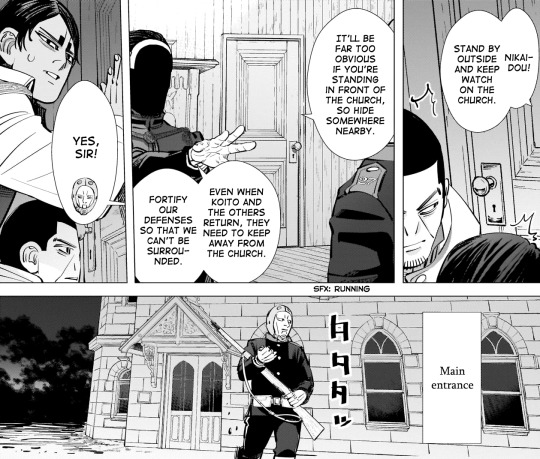
...and spot Sugimoto we can count on him to go in berserk mode, scream ‘SUGIMOTO SAICHI! MY NAME IS NIKAIDOU KOUHEI. YOU KILLED MY BROTHER! PREPARE TO DIE!’ and reveal to everyone how Sugimoto and Shiraishi are there, possibly interrupting the whole interrogatory and letting us wonder for many more chapters WHAT IN THE WORLD HAPPENED DURING THE NOPPERABOU INCIDENT. So please Nikaidou, don’t be around or scream discreetly. We don’t really want you to bother Tsurumi, Sofia and Asirpa NOW.
#Golden Kamuy#Tsurumi Tokushirou#Asirpa#Sofia#Tsukishima Hajime#Koito Otonoshin#Hasegawa Olga#Hasegawa Fina#Kiroranke#Wilk#Sugimoto Saichi#Shiraishi Yoshitake#Hijikata Toshizou#Golden Kamuy Ramblings and Theories
37 notes
·
View notes
Note
For us imperialism
While some of area that makes the US we got fairly depends who you look at it. Or were given to us
We brought about area that makes about 17 states in lousanaia purceha cant' spell sorry from France
We brought the US virgin from Denmark
We brought Alaska from russia
texas again fairly
Kinda got the west coast daily depends how you look are it
For Hawaii since in 1993 when the US government said the overthrow in the 1890s was illegal al lot of native Hawaiians are pissed which is free in my book and want independence and of any state has the best argument for leaving the union is Hawaii
Even that I still think that Hawaii cant leave since the state thay tried to leave we had civil war. And that question went up the US supreme court in the Texas or John vs case that no state can leave the union and one of the conservative judges on the us supreme court said in 2006 "if the civil war was taught us anything that no state can leave the union" or something like that.
I feel like in real life the US government should give native Hawaiians more say and given them a senator and a rep and given them some most of thru land back and have the be treated as a state but while it really being as state
With countries former under American rule
Philippines
Palau
Marshall islands
Mixronayail cant spell is name
Cuba
For cuba and Philippines we got after the Spanish Americans war
For the 2,3, and 4 ones we got by the UN after ww2. Which under free asstion with the uSA
For current us territories
Guam
US virgin islands
Americans somea
Northern Mariana Island
Puerto Rico
We got guam after a the Spanish American war
Like I said we brouth us virgin island from DenmarK rest were given to us
In hetalai since is canon that ameica boss and government don't tell him everything
I fell for Hawaii his boss will just give America Hawaii while not saying how he got it.
I feel like America found out in the 1980s how Hawaii become a part of the US and told his government to say sorry
I feel like on hetalai version of the US constitution since the founding fathers didn't want America boss to have too much power I also fell that didn't want the Alfred F Jones to have too much power as well. So I feel like he cant given countries indepnece without his government and boss permission
Since America knows it feel like to be treated badl by a country that is miles away he tries to give thses territories the best treatment he can.
Wow, this was a long ask! I definitely don’t have the knowledge to address all of the real life facts about the territories you mentioned, but I’ll try to get to the points I think you wanted to talk about in regards to Hetalia.
I definitely think it’s possible America’s bosses lied to him or didn’t explain how Hawaii was acquired. There’s a reasonable case for Hawaii to be personified within Hetalia since it was an independent civilization and country before it became part of the U.S. Hawaii may have told America how they were acquired long before the 1980s, but this doesn’t mean the government would have acted any sooner, even if Alfred kept bringing up the issue.
I could definitely see the U.S. founders wanting to avoid giving Alfred too much power. They didn’t want the president to have as much power as a king, and the threat of Alfred having king-like powers is even greater since he’s an immortal nation personification that can’t die the way a human can. Within Hetalia, none of the nations seem to have much control over their governments. Governments are run by humans, and those governments are the ones who make the decisions about acquiring territories and granting independence to territories. The nations generally have to cope with what their governments decide.
I agree that it’s within America’s character to treat his territories the best he can. This may be difficult, especially with the areas further from the U.S. mainland. Since you mentioned England, I think part of the reason America was neglected was because England’s government was also wanting him to do things in England and with all the other colonial possessions he had at the time. The neglect wasn’t purposeful, but it still had a negative impact on America. I think America, because of his experiences with England as a colony, would do his best to avoid leaving his territories alone for long stretches of time. He’d make a particularly strong effort to see any child-aged personifications under his care as often as he could.
13 notes
·
View notes
Photo


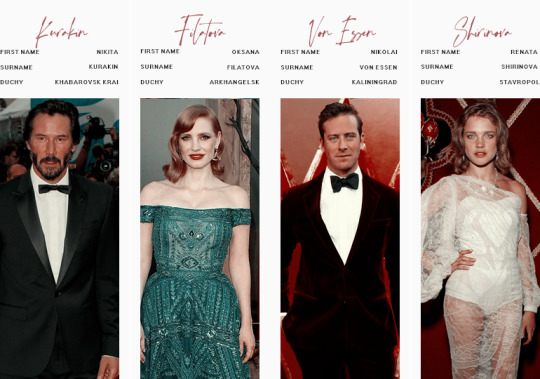
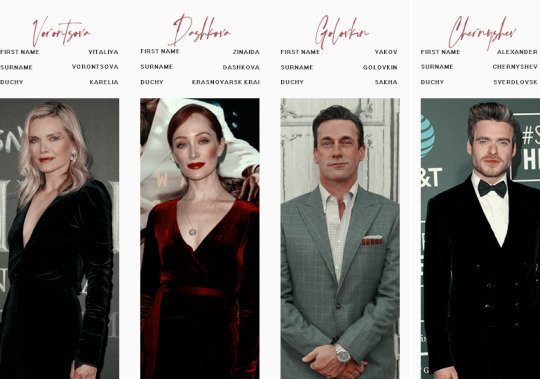
- ̗̀ HSHQTASK036: RUSSIAN NOBILITY ̖́-
RUSSIA is divided into 84 duchies. all 84 duchies are inside 9 grand duchies all of which are governed by a duke or a duchess that is appointed by the tsar. the title of a grand duke or grand duchess cannot be inherited. the grand duke or duchess is chosen from “regular” dukes and duchesses. all members of the imperial family carry the title of grand duke or grand duchess despite not governing a grand duchy. all members of the imperial family have their own duchies though. map under the cut & the blurbs !
- ̗̀ THE GRAND DUCHIES ̖́-
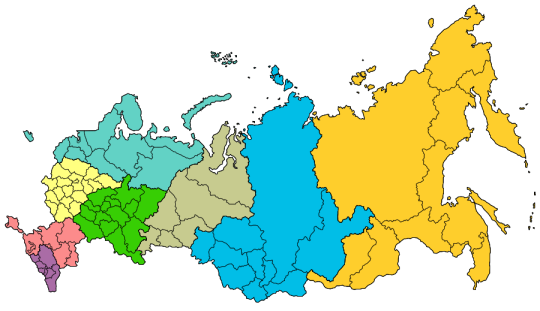
TURQUOISE: the grand duchy of northwestern russia. YELLOW: the grand duchy of central russia. PINK: the grand duchy of southern russia. LILAC: the grand duchy of north caucasian russia. GREEN: the grand duchy of volga. BEIGE: the grand duchy of ural. BLUE: the grand duchy of siberia. ORANGE: the grand duchy of far eastern russia. not pictured: the grand duchy of finland, north west of the grand duchy of northwestern russia.
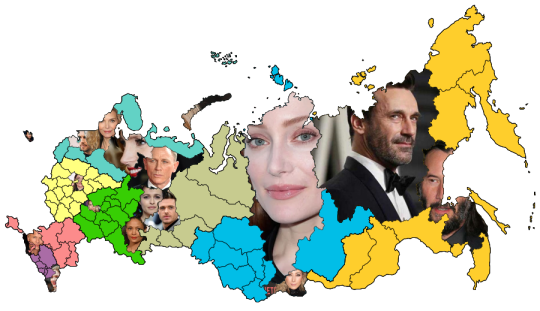
( don’t talk to me about the quality of these photos idk how to use ps okay 😭😭😭 )

OKSANA FILATOVA, the 42 year old duchess of ARKHANGELSK and the grand duchess of NORTHWESTERN RUSSIA who resembles JESSICA CHASTAIN
the filatova family is the latest addition into russian nobility. oksana was given her title by alexei when the former duke of akhangelsk died and his only son was in prison. this was three years ago, before then oksana had been part of alexei’s staff and a close friend. oksana received the title of a grand duchess last year when the former duke of komi passed away. oksana is definitely loyal to the imperial family, no doubt about that. she is, however, detested by all of her neighbours including vitaliya and the new duke of komi --- both of them expected to receive the title of a grand duchess/duke.

NIKITA KURAKIN, the 54 year old duke of KHABAROVSK and the grand duke of FAR EASTERN RUSSIA who resembles KEANU REEVES
nikita kurakin is first and foremost a general. he is steadfast and reliable. the romanovs trust him. far eastern russia is his kingdom and anyone who challenges his leadership gets a slap on the wrist. he isn’t necessarily liked but he isn’t feared. he is very fair and doesn’t misuse his power. kurakin’s one of the most important figures when it comes to east asian politics. usually when kurakin is on a diplomatic mission, it’s a successful one.

GRIGORI KOLOBKOV, the 68 year old duke of KRASNODAR and the grand duke of SOUTHERN RUSSIA who resembles ED HARRIS
kolobkov is one of the few ussr generals to survive the revolution --- and by that we mean that he was the only general to survive the change in leadership. kolobkov sided with the royal family at a very crucial time and managed to avoid an execution. kolobkov’s expertise landed him a duchy during tsar mikhail’s reign. currently he is pretty much leading the attack on ukraine.

RENATA SHIRINOVA, the 37 year old duchess of STAVROPOL and the grand duchess of NORTH CAUCASIAN RUSSIA who resembles NATALIA VODIANOVA
shirinova grew up in france --- her family only returned to russia when her father’s family’s title was returned to him. the shirinovas weren’t the loudest supporters of the romanovs when they were fighting for the country. this is the reason why the shirinovas have been rubbing elbows with the romanovs ever since their return to russia. renata is no different from her parents. the problem is that their behaviour just irritates the romanovs. but at least they are loyal !

LIZAVETA ORLOVA, the 34 year old duchess of MORDOVIA and the grand duchess of VOLGA who resembles NATASHA POLY
lizaveta inherited her title from her father but it is her mother who is important. lizaveta belongs to one of the richest families in russia --- while she could use her title to make changes happen, to make sure certain kind of laws happen... it’s her mother’s name and mother’s money that gives her real power. people are afraid of her because she makes problems ( people ) disappear with a snap of her fingers. she was named the grand duchess of volga 100% because of her mother and not because of her father.

ZINAIDA DASHKOVA, the 37 year old duchess of KRASNOYARSK and the grand duchess of SIBERIA who resembles LOTTE VERBEEK
dashkova will stab you in the back if you upset her. she is as power hungry as they come. her resourcefulness has no competition. alexei bought her ‘loyalty’ by giving her the title of grand duchess of siberia. dashkova always hears the imperial family out and usually makes decisions that are in the romanovs’ favour but there are times when dashkova’s own ambitions are more important than being liked by the romanovs. she only respects the hierarchy when it benefits her --- she’s the type who forgets to use honorifics unless she wants something from you.

ALEXANDER CHERNYSHEV, the 36 year old duke of SVERDLOVSK and the grand duke of URAL who resembles RICHARD MADDEN
alexander chernyshev is blue eyed. you can tell him just about anything and he’ll believe you. he’s an army captain even though no one understands how he is equipped to lead anyone. alexander was given the title of a grand duke by tsar mikhail almost a decade ago. the reason ? alexander listens. you don’t need to be afraid of the man double crossing you or causing a scene.

ANNA ROMANOVA, the 41 year old duchess of MOSCOW and grand duchess of CENTRAL RUSSIA who resembles ANTJE TRAUE
the moscow duchy is economically and culturally an important duchy in russia and having a romanov govern it was important to the family. it was trusted to anya who had always showed competence to rule. anya is the only royal to have her own grand duchy. czar mikhail tried to avoid nepotism whenever he had to choose the next grand duke or duchess. when the previous grand duke of central russia passed away, anya was the only duchess in central russia the romanovs could trust thus she was given the powerful title.

YAKOV GOLOVKIN, the 49 year old duke of SAKHA who resembles JON HAMM
golovkin is a wild card. he is always looking out for himself and takes just about any deal that benefits him. he rarely visits his duchy as it is quite far away from st petersburg. he has never lived in his duchy --- but he really appreciates the money he gets through his title. the romanovs dislikes him, vitaliya likes that he can be bought.

IVAN KAPUSTIN, the 53 year old duke of KOMI who resembles DANIEL CRAIG
kapustin inherited his title from his father a year ago. he’s an army colonel. kapustin may not have held his title for a very long time but he’s been doing his father’s work for a very long time. his military career is also a respectable one. people were expecting him or vitaliya to become the ruler of the grand duchy. he and vitaliya pretty much terrorize oksana --- partly out of pettiness and partly because there’s a chance that oksana might give the title up.

NIKOLAI VON ESSEN, the 35 year old duke of KALININGRAD who resembles ARMIE HAMMER
nikolai’s duchy is barely russian. he has a lot of freedom when it comes to governing. the von essen family has been important members of the russian navy for centuries --- it is why the family received the duchy of kaliningrad when the duchies were reinstated.

LANA YELCHIN, the 46 year old duchess of BASHKORTOSTAN who resembles THANDIE NEWTON
lana yelchin started out as a politician. she had a pretty successful career considering her age --- and then she married the duke of bashkortostan. people liked lana more than they liked her husband so when the man died and it was up to the romanovs to decide whether the man’s cousin would get the duchy or lana... the romanovs chose lana. lana’s heart is in the right place and her experience in ‘people’s politics’ gives her an ability to see issues from a different point of view. she is a person people ask for advice when they are unsure about the effects of new legislation, etc.

MARINA GLUKHOVA, the 38 year old duchess of BURYATIA who resembles DICHEN LACHMAN
glukhova hasn’t been a duchess for a very long time. she hasn’t even been part of the court for a long time. marina is a illegitimate daughter of the former duke of buryatia. she only came to know about her birthright when, on his deathbed, her father contacted her. marina wasn’t going to accept the title when it was offered to her but eventually caved. it’s been a bit of a rollercoaster for her, she has learnt quickly but her down-to-earth kind of attitude has not disappeared. marina has no patience for mind games and she tends to keep to herself. marina’s passion is foreign affairs though and she’s been very proactive in her role of an honorary ambassador.

NATALYA ANTOPOVA, the 53 year old duchess of PERM who resembles HELENA BONHAM CARTER
natalya is the first one from her family to have a title. natalya was young, reckless and passionate when the white army recruited her to fight for the imperial family. she had no political opinions but the royalists gave her life a reason, something the soviet union had failed to do. natalya was smart and tended to think outside of the box, which made her stand out. her loyalty was rewarded later on and she was given a duchy. natalya is still a bit reckless and it shows in her style of governing. plans are made quickly, budgets are approved haphazardly...

VITALIYA VORONTSOVA, the 58 year old duchess of KARELIA who resembles MICHELLE PFEIFFER
u know my bitch. definitely bitter about the title of a grand duchess.

KONSTANTIN ROMANOV, the 34 year old duke of ALEKSANDR OBLAST who resembles CASEY DEIDRICK
aleksandr oblast is the new name of leningrad ( the duchy that borders st. petersburg ) because the romanovs wanted to erase everything that referred to stalin or lenin. aleksandr is the name of the romanovs’ grand father.
#hshqtask036#[ TASK ]#[ TASK036 ]#had i not been a fool i would have done the graphics so that they were divided by grand duchies#but it's too late#also#all of them are close to my heart#some more than the others#we went a lil bit crazy
20 notes
·
View notes
Text
Farthest North
Chapter 10 - Cinderella Didn’t Run
Word count: 1310
The festivities were going smoothly, albeit early, and America was worried. Alaska hadn't shown yet, and he remembered she always wanted to help... so he gave her a later time than everyone else. It was only 5:52... maybe he was worrying too much... Then he saw her. At first a faint silhouette, but the light from inside made her stars sparkle on her face as she smiled sheepishly. The shorter Country marveled at the exquisite Kimono that adorned her. Blue and gold, an obviously expensive silk, and a small, elegant diamond necklace.
"Am... am I late?" she questioned, jolting the American from his stupor.
"No, of course not," he smiled, sunglasses hiding his wide eyes, "They all came earlier."
At least it wasn't a lie.
He led the grown State in, announcing her arrival, and everyone clapped, most having met her already, but a few hadn't. She smiled bashfully, a barely seen blush dusting her cheeks. America led her through the crowd, telling her all who were there. U.K., or Britain, hadn't seen the woman yet, and was quite surprised at her height, despite the stories he's heard. America exclaimed how he was so proud of his daughter, going through many Countries to finish the formalities.
Japan sighed at the table, having spoken to Alaska already. She was with Germany and Russia, who weren't quite sure if this party was for Alaska or for America just to say how proud he was of her. Russia looked to the woman at their table.
"You sound yike you just svooned." he snickered.
"Shut it, baka*," she growled, "You can't say you didn't stare when she walked in, albeit for different reasons, not even Germany acted like he was disinterested!"
Said Country took a long pull from his champagne...
"You being a matchmaker now?" Russia sneered.
"No," she huffed, "Look at that Kimono! It's the prettiest I've seen! The design, the patterns. Someone took great care in it."
They watched as the State soon came to greet China. Alaska bowed, confused when he did not bow next, only to come up, bringing a hand to her mouth in surprise as he then bowed, a bit lower than hers.
"He bowed lower?!" Japan screeched.
"So?" Russia huffed.
"No-no-no! You don't get it! China rarely bows anymore, once Imperial China died the tradition almost died with him, even I do it more than him and his people, if he's bowing then he holds her in very high esteem! And by that face I think she knows it."
The three watched as China brought himself up, his traditional garb nowhere near as elegant as hers, his red and gold contrasting to Alaska's blue. He led her away from America, who was about to protest, but thought better of it when his father looked toward him suspiciously.
Japan bounced in her seat as she smiled, Germany calling her a 'dork' as he chuckled. She then started to mumble, failing to notice the two red and blue figures coming her way.
"Oh I know! Chilaska!"
Germany spit his drink back into the glass while Russia wheezed, making the female Country look between them confused, until she finally saw the two shadows... She looked up sheepishly, a nervous smile on her face.
"Hey," she waved.
"Ni hao**, Japan," China looked very unamused, while Alaska shook her head with a small giggle, "Alaska wanted to make sure you all were doing well."
"She can't ask us herself?" Russia laughed, wiping a tear from his eye.
"China beat me to the punch," she explained with a sweet smile, "I'll assume you're doing well then, according to your snickers and Japan's starry eyed look."
Said Country had stood, wearing her own Kimono, the dusty pink like fallen Cherry Blossoms. She was able to get Alaska to step away from the other Country as she examined the work done. The seams were flawless, design made to fit her and her alone, and the colors were stunning.
"Blue, for ascendance, and Gold, for wealth and value," China stated proudly, "A perfect combination."
"I dhought it just matched her fy-ag," Russia stated, taking a long pull from the champagne bottle, much to Germany's disagreement.
"Not everything simply means what's obvious," the man rolled his eyes.
"Don't get all philosophical on us," Japan twittered, "You'll put them to sleep."
Alaska laughed, earning all four's attention as they smiled soft smiles. Her laugh was so sweet, like hot cocoa on a chilly winter's day, or a bright fire lighting up the room as you read a book. They wanted to hear it more often.
"Forgive me China, I shouldn't laugh."
"It's quite alright, my dear," he nodded his head slowly, glaring at Japan as she squealed, "It was a simple poke of fun anyway."
The night continued on, Alaska having the time of her life as she mingled with other Countries. North Korea had taken quite the disliking of her, only coming because South Korea wouldn't stop pestering him, but the southern half seemed to like the State well enough. Saudi Arabia, despite his original vote to help the poor State, also disliked her, all because she claimed that she didn't want the oil he would have happily supplied. Of course she said it was a possibility for the future, but until then, he was a rival. She spoke with her adoptive grandfather, U.K. who simply adored her, but one question he just had to ask:
"Why not wear one of your own ensembles?" he questioned, "I'm sure your people have many elegant designs."
"Any elegance in our designs are ceremonial only," she explained, "unfortunately once I was adopted by America, and during my time beneath Russian Empire, most of my traditions were lost, along with such ensembles. That, and I'm afraid I didn't have anything fit for a formal gathering."
France felt her fashion sense tingle, tracking it all the way to her husband and Alaska. She greeted the State with a smile.
"Oh how lovely you've grown," she cooed, "give me a turn, dearie."
She sighed at the elegant silk that adorned the woman.
"Parfaite***," she giggled, "You must tell me, what designer created your flag? It's so simple yet elegant, matches you perfectly!"
"No designer created it," Alaska shook her head, a soft smile becoming an amused one at France's confused expression, "Before I became a State there was a territory wide contest, for the children."
"A child designed it?" France gasped, what a turn of events in her world.
"A young Native boy named Benny Benson, he was 13," Alaska smiled, remembering that loved day, "His was chosen over 700 other participants. I memorized his description by heart:
'The blue is for the Alaska sky and the Forget-me-not, an Alaskan flower. The Northern Star is for the future state of Alaska, the most northerly in the union. The Dipper is for the Great Bear--symbolizing strength.' "
Alaska wiped away a tear, still smiling.
"He was given to an orphanage after his mother died, so he depicted me as the prettiest thing he saw before going to bed each night, Ursa Major and the North Star. He was so excited when he met me in person. We were fast friends from then on."
France and U.K. looked to each other, then back up to the taller woman, each with a pained expression. Such irony littered in her past... A simple flower... Yet it described her future as well. Becoming a State... and her strength compares to no other it seems.
"Pauvre cher *'..." France sighed, wiping away the last tear with her handkerchief, "Come, let us have some drinks," she suggested, and offered the State some champagne, but she declined, enjoying a simple sparkling cider.
--------------------
*Baka - fool (Japanese)
**Ni hao - good day (Chinese)
***Parfaite - Perfect (French)
*' Pauvre cher - you poor dear (French)
#countryhumans#countryhumansamerica#countryhumansuk#countryhumansbritain#countryhumanschina#countryhumansjapan#countryhumansrussia#countryhumansgermany#countryhumansrussianempire#countryhumansussr#statehumans#statehumansalaska#america#uk#britain#china#japan#russia#germany#russianempire#ussr#alaska#fanfiction#au#counrtyhumansau#alternateuniverse#farthestnorth
4 notes
·
View notes
Photo

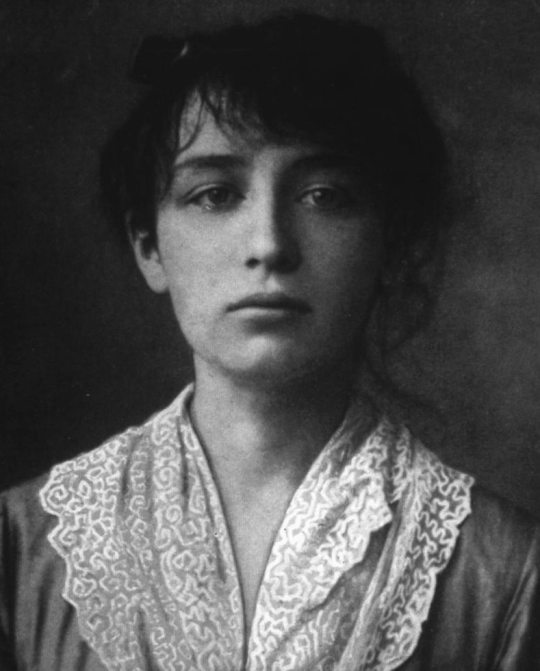
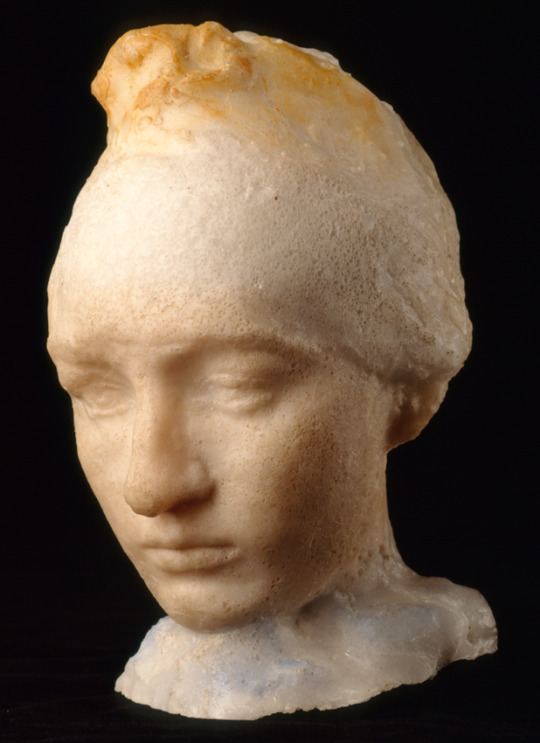
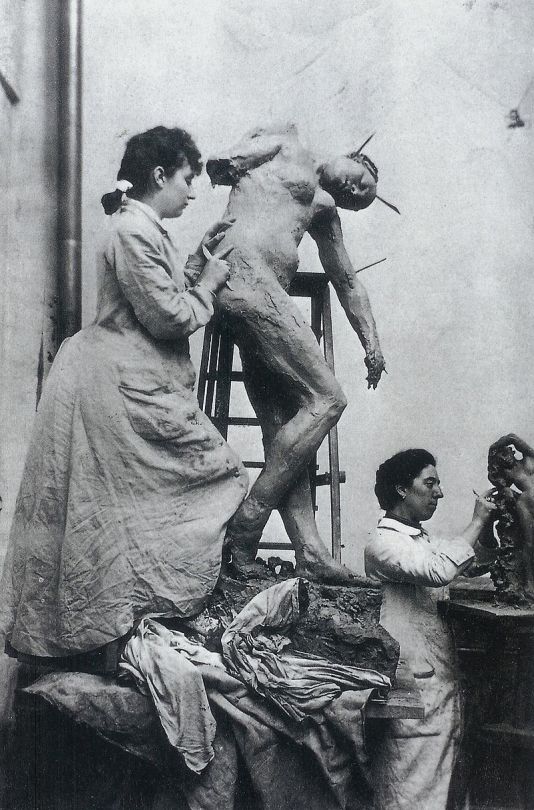
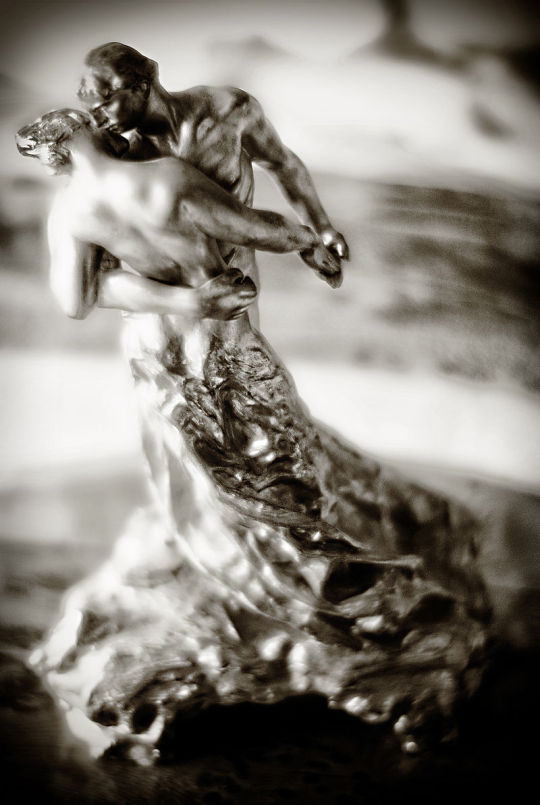
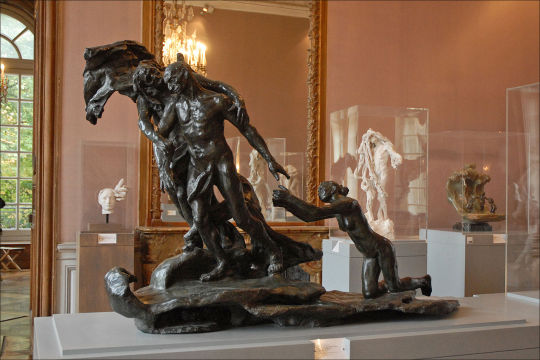


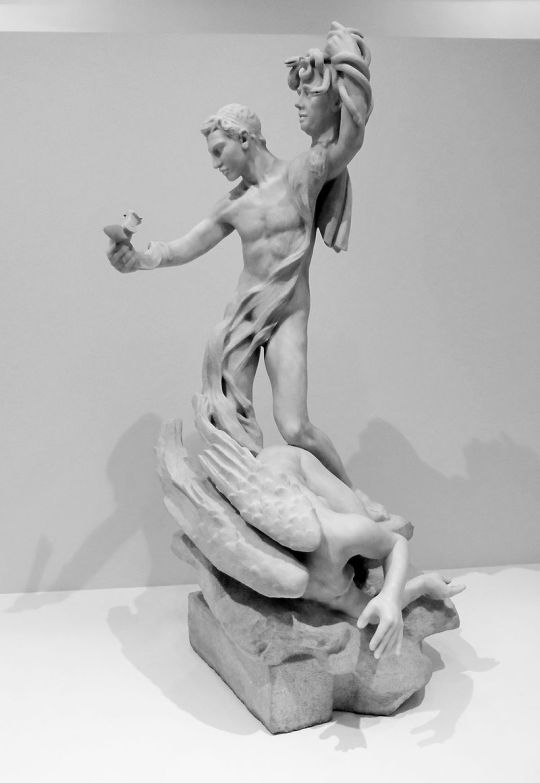
Camille Claudel’s 155th Birthday
Born 8 December 1864 - Fère-en-Tardenois, Aisne, Second French Empire
Died 19 October 1943 (aged 78) - Montdevergues, Vaucluse, Vichy France
Camille Claudel (French pronunciation: [kamij klɔdɛl] (listen); 8 December 1864 – 19 October 1943) was a French sculptor who died in relative obscurity, but has gained recognition for the originality and quality of her work.[1][2] Claudel is known for such sculptures as The Waltz, The Mature Age, and others.
The national Camille Claudel Museum in Nogent-sur-Seine opened in 2017, and the Musée Rodin in Paris has a room dedicated to her works.
Creative period
Study with Alfred Boucher
Claudel was fascinated with stone and soil as a child, and as a young woman she studied at the Académie Colarossi, one of the few places open to female students.[5] She studied with sculptor Alfred Boucher.[6] (At the time, the École des Beaux-Arts barred women from enrolling to study.)
In 1882, Claudel rented a workshop in Paris with Jessie Lipscomb, Emily Fawcett and Amy Singer, the daughter of John Webb Singer, whose foundry in Frome, Somerset, made large-scale bronze statues that are familiar today. Several prominent Frome works are in London, including the Boadicea group on the Embankment, Cromwell, which graces the lawn in front of the Houses of Parliament, and the figure of Justice atop the Old Bailey. General Gordon on his camel at Chatham Barracks was also cast in Frome, as were the magnificent eight lions that form part of the Rhodes Memorial in Cape Town. Claudel visited Frome and the families of her fellow sculptors. All of these English friends had studied at the South Kensington Schools – that would become the Royal College of Art – before moving to Paris to be at the Academie Colarossi, where they had all met. Camille obviously felt very at home with Amy’s family in Frome and prolonged her stay.[7]
Alfred Boucher had become Claudel's mentor, and he also provided inspiration and encouragement to the next generation of sculptors such as Laure Coutan. Claudel was depicted by Boucher in Camille Claudel lisant,[8] and later she sculpted a bust of her mentor.
After teaching Claudel and the other sculptors for over three years, Boucher moved to Florence. Before he left he asked Auguste Rodin to take over the instruction of his pupils. Rodin and Claudel met, and their artistic association and the tumultuous and passionate relationship soon began.
Auguste Rodin
Claudel started working in Rodin's workshop around 1884 and became a source of inspiration for him. She acted as his model, his confidante, and his lover. She never lived with Rodin, who was reluctant to end his 20-year relationship with Rose Beuret.
Knowledge of the affair agitated her family, especially her mother, who already detested her for not being a boy and never approved of Claudel's involvement in the arts.[9][10][11] As a consequence, Claudel left the family home.
In 1892, after an abortion, Claudel ended the intimate aspect of her relationship with Rodin, although they saw each other regularly until 1898.[12]
Le Cornec and Pollock state that after the sculptors' physical relationship ended, she could not get the funding to get many of her daring ideas realized, because of gender-based censorship and the sexual element of her work. Claudel thus had to either depend on Rodin to realize them, or to collaborate with him and let him get the credit as the lionized figure of French sculptures. She also depended on him financially, especially since her loving and wealthy father's death. This allowed her mother and brother, who were suspicious of her lifestyle, to keep the money and let her wander around the streets dressed in beggars' clothes.[13]
Claudel's reputation survived not because of her once notorious association with Rodin, but because of her work. The novelist and art critic Octave Mirbeau described her as "A revolt against nature: a woman genius." Her early work is similar to Rodin's in spirit but shows imagination and lyricism quite her own, particularly in the famous The Waltz (1893).
Louis Vauxcelles states that Claudel was the only sculptress on whose forehead shone the sign of genius like Berthe Morisot, the only well-known female painter of the century and that Claudel's style was more virile than many of her male colleagues. Others, like Morhardt and Caranfa, concurred, saying that their styles have become so different, with Rodin being more suave and delicate and Claudel being vehement with vigorous contrasts, which might have been one reason that led to their break up, with her becoming ultimately his rival.[14][15][16]
Claudel's onyx and bronze small-scale La Vague (The Wave) (1897) was a conscious break in style from her Rodin period. It has a decorative quality quite different from the "heroic" feeling of her earlier work.
Legacy
Though she destroyed much of her work, about 90 statues, sketches and drawings survive.
Some authors argue that Henrik Ibsen based his last play, 1899's When We Dead Awaken, on Rodin's relationship with Claudel.[53][54][55][56]
In 1951, Paul Claudel organized an exhibition at the Musée Rodin, which continues to display her sculptures. A large exhibition of her works was organized in 1984. In 2005 a large art display featuring the works of Rodin and Claudel was exhibited in Quebec City (Canada), and Detroit, Michigan, in the US. In 2008, the Musée Rodin organized a retrospective exhibition including more than 80 of her works.
The publication of several biographies in the 1980s sparked a resurgence of interest in her work.
Camille Claudel (1988) was a dramatization of her life based largely on historical records. Directed by Bruno Nuytten, co-produced by Isabelle Adjani, starring herself as Claudel and Gérard Depardieu as Rodin, the film was nominated for two Academy Awards in 1989. Another film, Camille Claudel 1915, directed by Bruno Dumont and starring Juliette Binoche as Claudel, premiered at the 63rd Berlin International Film Festival in 2013. The 2017 film Rodin co-stars Izïa Higelin as Claudel.
Composer Jeremy Beck's Death of a Little Girl with Doves (1998), an operatic soliloquy for soprano and orchestra, is based on the life and letters of Camille Claudel. This composition has been recorded by Rayanne Dupuis, soprano, with the Slovak Radio Symphony Orchestra.[57] Beck's composition has been described as "a deeply attractive and touching piece of writing ... [demonstrating] imperious melodic confidence, fluent emotional command and yielding tenderness." [58]
Seattle playwright S.P. Miskowski's La Valse (2000) is a well-researched look at Claudel's life.[59][60]
Composer Frank Wildhorn and lyricist Nan Knighton's musical Camille Claudel was produced by Goodspeed Musicals at The Norma Terris Theatre in Chester, Connecticut in 2003.[61]
In 2005, Sotheby's sold a second edition La Valse (1905, Blot, number 21) for $932,500.[62] In a 2009 Paris auction, Claudel's Le Dieu Envolé (1894/1998, foundry Valsuani, signed and numbered 6/8) had a high estimate of $180,000,[63] while a comparable Rodin sculpture, L'éternelle Idole (1889/1930, Rudier, signed) had a high estimate of $75,000.[64]
In 2011 world premiere of Boris Eifman's new ballet Rodin took place in Saint-Petersburg, Russia. The ballet is dedicated to the life and creative work sculptor Auguste Rodin and his apprentice, lover and muse, Camille Claudel.[65]
In 2012, the world premiere of the play Camille Claudel took place. Written, performed and directed by Gaël Le Cornec, premiered at the Pleasance Courtyard Edinburgh Festival, the play looks at the relationship of master and muse under the perspective of Camille at different stages of her life.[
In 2019, to mark the 155th anniversary of Claudel's birth, Google released a Google Doodle commemorating her.
https://en.wikipedia.org/wiki/Camille_Claudel
Camille Claudel née à Fère-en-Tardenois (Aisne) le 8 décembre 1864, et morte à Montdevergues (Montfavet - Vaucluse) le 19 octobre 1943, est une sculptrice et artiste peintre française.
Collaboratrice, maîtresse et muse du sculpteur Auguste Rodin2, sœur du poète, écrivain, diplomate et académicien Paul Claudel, sa carrière est météorique, brisée par un internement psychiatrique et une mort quasi anonyme. Un demi-siècle plus tard, un livre (Une femme, Camille Claudel d'Anne Delbée, 1982) puis un film (Camille Claudel, 1988) la font sortir de l'oubli pour le grand public.
Son art de la sculpture à la fois réaliste et expressionniste s'apparente à l'Art Nouveau par son utilisation savante des courbes et des méandres.
https://fr.wikipedia.org/wiki/Camille_Claudel
5 notes
·
View notes
Text
The Cult of the Proletariat
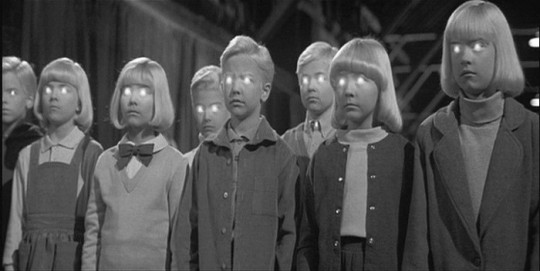
“Because the horror of Communism, Stalinism, is not that bad people do bad things — they always do. It’s that good people do horrible things thinking they are doing something great.”
-Slavoj Zizek
‘But as in all cults, what’s central to the Communist Party is the belief system and the elimination of nuance. From there you’re very slowly led down the road to fanaticism and mass murder.’
– Alexei Sayle
I have found a way to tell apart Leninists (otherwise known as Communists or Bolsheviks in the common parlance) from what you might call the reasonable left. It is not the outfits, stained by take-away and Tippex, or their odour, because deodorant is a bourgeois affectation. Instead it is their answer to one rather simple question: ‘Do you trust people to make their own decisions?” I have never met a Leninist that didn’t say No. An addendum to that might be the question: “If you could have your revolution but it would make people poorer and less free, at least in the short term, would you still want it?” Once again I have never met one that didn’t answer in the affirmative. It is the same toxic combination of misanthrope and fanaticism that you can now see in Brexiteers in Britain, and amongst Fascists the world over. It is the belief that you and your tribe alone have received the revealed truth from on-high, and however you see fit to make that a reality is acceptable. It is the language of a cult.
It’s a word that is thrown around a lot and there are even multiple competing definitions, but it is essential to understand what a cult is if we are to understand the toxicity at the heart of Leninist parties of the past and present. What are the obvious signs of a cult? In my opinion, there are 10 unequivocal signs:
1. A small group of people united by a Utopian ideology (or religion) who stand outside normal society.
2. A dominant leader/s that hold complete power over the lives of its members.
3. An all-or-nothing worldview. “Either the Revolution comes or the world will end.”
4. A cadre or administrative class that directs the majority of members.
5. Gaslighting. The changing of facts and reality to suit the party.
6. Mental, physical or sexual abuses (see the SWP in the UK)
7. The policing of language, opinions and the effective creation of secular blasphemy.
8. The welding of the social and the political. The party becomes your only community, sometimes to the detriment to your family and older friends.
9. Those that leave the party become apostates and are to be shunned and demonised.
10. A uniform. In this case conformity of clothing is encouraged through bullying and mocking rather than an order from above.
It is hard to explain to those that have not experienced life in a cult why anyone would willingly join such a toxic entity. Left wing cults, like all cults, don’t look toxic from the outside. In fact, when you first join you are often showered with not only attention, but with a sense of purpose. You feel that finally you are with people that see the problems of the world as you do and are motivated by high ideals of humanism and solidarity. This is described by some psychologists as the lovebombing stage. It is a very powerful indoctrinating tool and often keeps individuals attached to the party long after the toxic nature of the party has become apparent.
In this I can at least speak from personal experience. I was a member of a Trotskyist party, that shall go unnamed, in my youth and I got a firsthand experience of cult tendencies within the left. All the cliches were there; the lovebombing; the close social circle; shadowy General Secretary; the strict hierarchy; the self-censorship of speech; the pandering to party leaders; the Gaslighting; the blasphemy; and the apostates. I have done a large amount of study of what are known as cluster B personality disorders (anti-social, narcissistic and Borderline) since, to try and understand what had happened to me, and I can attest to the presence of these toxic behaviours within all levels of the party structure. I am not the first to notice the cult tendencies within Leninist parties, in fact a cursory google search will present you with ample evidence of how commented upon this is. It really is one of the worst kept secrets on the left. Yet, these parties still persist and in the case of Ireland are the only real alternative to the parties of the Landlord class. As an Anarchist with a sense of history and responsibility this is exceedingly worrying.
This is not to suggest that Anarchist groups can’t become cult like. I spent time in a certain British anarchist group, that again shall not be named. In many ways it functioned along similar lines to the Leninist party I had formerly been part of . While there was a rotating leadership role, the same small group of people swapped the officer positions, and there was the same narrow mindedness to new ideas. Thankfully there is a great deal more individualism amongst Anarchists and this small toxic group were eventually expelled from the organisation. To some extent cult behaviour is a human failing. The legitimate and noble desire to make the world a better place can easily be perverted by disordered people for their own pleasures. You can see this in countless churches, sects, and organisations of every hue. In the case of political groupings, at least, anarchism has an answer and it is in our very DNA. A distrust of authority. Leninists parties can never be reformed from within given their very inspiration was taken from the mind of an authoritarian cult leader, Vladimir Lenin.
If you have the time or inclination to read about the father of 20th century Communism, you will learn many things, none particularly endearing, whether it be his: accepting German Imperial help in 1917; crushing the Soviets, snuffing out workers’ democracy; the invasion of Poland in 1920; the founding of the vile gulags; the rejection of a democratic vote in 1917 that the Bolsheviks lost; the creation of the brutal Checka, etc. The figures vary, but Lenin’s Red Terror is believed to have killed anywhere between 100,000 and 1.3 million people. The fanatic view of the Lenin towards any challenge to the new regime was published within the organs of the party: ‘anyone who dares to spread the slightest rumor against the Soviet regime will be arrested immediately and sent to concentration camp”. By 1921 70,000 were imprisoned in the brutal gulag system. The authoritarian and genocidal views of the Leninists were apparent quite early with Grigory Zinoviev declaring in 1917: ‘To overcome our enemies we must have our own socialist militarism. We must carry along with us 90 million out of the 100 million of Soviet Russia’s population. As for the rest, we have nothing to say to them. They must be annihilated”. The fact that so many within the left still celebrate this man is stunning to behold, but then again he had the good fortune to die before the experiment of Leninism reached its apex under his protege Stalin. He would order the deaths of tens of millions of his own people, whether through the repression of the secret police or through man made famines, and after World War II enslave the population of Eastern Europe for half a century. And yet, the failure of the Left to ever really exorcise the ghost of the USSR and Leninism is one of our greatest failings. The supposed unique evil of Josef Stalin is a lazy way to avoid the truth, that the Bolsheviks were totalitarians in their very DNA, due to the teachings of Lenin. The USSR was in its origins a cult of Leninism extended to the entire Russian Empire. The Left need to except that the USSR is ours to own much like the right must accept Fascism as the logical extension of their own ideology. There is little to salvage in this experiment and the left should have long ago acknowledged Leninism as the twin evil of Fascism in the 20th Century. Unfortunately, it has not and we are left in a situation where anarchism remains at the fringes and the Leninist parties remain the only likely alternative to what must soon follow another violent collapse of Capitalism.
Any reasonable look at the enormous debt bubble forming around the world can not help, but lead you to the conclusion that a major global depression is looming. The conservative estimate is that there is 420 trillion dollars of debt worldwide. In Ireland we are one of the most indebted countries in the western world. Our debt to GDP ratio is 170% of GDP with some estimates as high as 210% of GDP. Each Irish citizen owes 42,000 Euro of debt. We will never be able to pay that off. This global debt can be combined with the huge wealth now centred in the hands of a very small cabal of oligarchs. Less than 100 persons now own over half the wealth of the entire globe. A vampiric ruling class long ago tore up the post-war social democratic settlement and could give a shit about the long term cost of their greed. As a result, the middle class’s spending power has shrunk to a fraction of what it once was. (Economics 101: the middle class buy the products of the ruling elite. If they have no money, and cannot borrow anymore, a crisis of capitalism ensues. It is that simple!) This makes a major depression almost inevitable, with some recent estimates saying it will arrive by as early as 2021. A collapse of capitalism will in rather short order unleash not only the demons of Fascism, but also the demons of Leninism. If, as I fear is likely, we are in the midst of another era of capitalist crisis similar to the 1920s and 30s, the corrupt parties of the centre across Europe will fall, and the masses will look for answers and alternatives to croney capitalism. At the moment the working class is bearing the brunt of neoliberalism and are looking to Trump, Brexit and the European Fascist right, the Orban’s and Le Pen’s. In the future there is no reason to suppose that some of remaining middle class will not make the same choice. In such a situation, it will seem wise to align ourselves with the Leninists in hopes of preventing another epoch of Fascist authoritarianism, but I would ask all anarchists to consider the old Bakunin quote: ‘When the people are being beaten with a stick, they are not much happier if it is called the People’s Stick’. We have been here before and we know what the Leninists will do if they get a whiff of power, therefore ‘What is to be done?’
Well, surprise, surprise, I recommend anarchism, but not in its current form. These days anarchists are a scattered and clicky sect within the left, rightly mocked for both the black block and its disinterested hipster membership alike. We must accept some of the blame for failing to take advantage of the post-Leninist era of the 90s-today. There were even some signs of anarchist ideas permeating the general left in the Seattle demonstrations of 1999, the occupy movement of 2011, the Arab Spring, and the yellow jackets, but these were to come to nothing. Clearly we have not learned from our own mistakes of the 20th century. Here I will perhaps lose some of my audience when I say that our principles held us back in the past. We were firm believers that ‘the Great is not enemy of the Good’. That ‘pragmatism was defeatism’. We, too, believed in an ‘all or nothing revolution’. Either it was complete eradication of the state and class system or it was not worth fighting for. This did us no favours in the past and it will do us little favours in the future. The world is not as we hope it to be, but rather as it is. Who will our allies be in the times to come? Unless we want to repeat our ancestors mistakes in Russia and Spain, it can’t be the Leninists. Rather I suggest the reasonable left I mentioned at the start of this article: Socialists, Left-Communists, Social Democrats, Republicans and even Liberals have all proved in the past to be determined enemies of the cults of Bolshevism and Fascism and capable of pluralism, though not always willing. It is possible to imagine a society of differing political structures coexisting, and of this being a truer reflection of the will of most people than any monolithic authoritarian Leftism can provide. These are our logical allies, some more than others, but to ensure history does not repeat itself we will have to find a way to both defend ourselves and inspire hope for a better future. For such a pluralist society of state socialists, anarchists, and even liberals, must not sap the hope and idealism of a genuinely Libertarian Socialist Revolution. We will have to walk a tightrope between reactionaries, both left wing and liberal. For without going down another rabbit hole, it was not just the Leninists that betrayed the Anarchists of Spain, it was also their republican and liberal allies. It will not be easy and much like our ancestors we will probably fail, but the difference between fighting for a society that allows differing political ideals the chance to bloom and the totalitarian cult of Leninism, seems a worthy trade off.
6 notes
·
View notes
Text
Suspend your Disbelief in Revolution - Gwilym Lee x Original Female Character - Chapter 1
A/N: Hello! This is the first chapter of my Russian Revolution AU Gwilym Lee fic, niche I know. Please enjoy!
MASTERLIST
FIC ON AO3
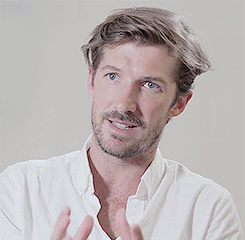
Grand Duchess Ekaterina Nikolaevna of Russia ran down the halls of the Winter Palace, chased by her sisters. It was 11th July 1916, her 24th birthday. Her mother, Alexandra Feodorovna, still babied her, but her sisters, Olga, Tatiana, Maria, and Anastasia, treated her like an adult. She was always glad of their company as a result. Their little brother, Tsarevich Alexei shouted down after them, unable to run with them.
Ekaterina had always been the odd one out of the Tsar’s 6 children. She was the oldest, born two years after her father, the-then Grand Duke Nicholas and now Tsar Nicholas II, and her mother, Princess Alix of Hesse, had married. She was the golden child, the first girl. Once her sisters had started coming along, the pressure on her mother to produce a son and heir had increased tenfold with each daughter. By the time Anastasia was born, 9 years after Ekaterina, Alexandra (as Alix was known in Russia) was on the verge of a nervous breakdown. Thankfully, little Alexei had arrived 3 years later and was suitably babied by both his parents. Alexandra babied all the children. Ekaterina hadn’t minded until she’d turned 18 and potential marriages had been arranged. She’d been unofficially engaged to Crown Prince Alexander of Serbia at the age of 19, but had turned him down when he got down on one knee and asked her. She didn’t love him, so why should she marry him, she’d argued to her father and his ministers the next day as the Crown Prince went back to Serbia with his tail between his legs.
Ekaterina had always believed in love. It was the one thing she truly believed in. She believed in God, of course, this is 1916 and she’s royalty, she has to, but love is the only thing that has properly captured her. She read copious amounts of romance novels and dreamed of finding somebody utterly perfect for her.That was the main reason she snuck out of the Palace so often. How would she meet the love of her life if she spent all of that life cooped up in Palaces and Castles away from the outside world?
She ducked behind a pillar as her sisters ran past, and quickly found her way to one of the secret passages shown to her by the servants. The passage led her directly to the outside world, to St Petersburg. She ducked out of the passage and into the summer air, jumping in the carriage that always took her into the city. Ekaterina thought her father might have an idea considering she always took a Palace carriage, but he hadn’t said anything and she was sure he would if he knew. She promised the driver that she’d be back in a few hours, and she made her way into St Petersburg. It had been renamed Petrograd nearly 2 years previously, but nobody in high society acknowledged it. It was, and always would be, St Petersburg to them. This time, though, she had permission from her mother. She’d been begging for a new dress for her birthday party and she’d been given permission to go alone. The only reason she’d snuck out was so her sisters didn’t join her.
She returned to the palace within a few hours with a cream embroidered dress in her possession. The boutique had been all too happy to fit it to her then and there, they couldn’t believe that a Grand Duchess had come in on her own.When she descended the grand staircase of the Winter Palace wearing it a few hours later to a huge crowd of foreign royalty, diplomats, politicians, aristocracy, and friends, she took the air out of the room with her beauty. She had always been considered the most beautiful of the Tsar’s daughters, but this moment sealed the deal. Her sisters, in matching white dresses, ran from the crowd to meet her, and the five of them almost paraded through the rooms, showing themselves off.
Ekaterina spent most of the party hiding in a corner, lest she be dragged into another dance by a diplomat or aristocrat three times her age. She felt somebody stand next to her, and she dreaded what she might see until she looked over.The man she locked eyes with wasn’t a lecherous diplomat. He was young, handsome, and offering her another glass of champagne.
“Thank you” she said quietly, only just loud enough to be heard over the noise of the room.
“You’re welcome” he replied, speaking Russian perfectly but with an accent.
“I’m Ekaterina”
“I gathered as much, Your Imperial Highness. I’m Gwilym”
“Gw-Gwilym?” She asked, faltering on the unusual name.
“That’s right. It’s Welsh. I’m British.” He explained. Ekaterina was surprised. She hardly ever met British people in Russia, especially since the war started.
“Why aren’t you fighting?” She asked. A young man like him should be in the Army or Navy.
“Eyesight.” He replied, pulling a pair of glasses from his pocket.
“Did you hear about the latest developments on the Western Front, Your Imperial Highness”
“No, I don’t get any news of the war unless it directly affects me, and it’s Ekaterina” She said, turning to face him more. She really took in his face for the first time. Gentle, noble, handsome.
“I feel like I might get shot if I call you Ekaterina”
“Only if you do it in front of my father” Ekaterina joked, nodding in the direction of the Tsar, who was holding court with his ministers.
“Imposing fellow” Gwilym whispered as he watched the most powerful man in Eastern Europe make an awful joke, and receive a response befitting the world’s greatest comedian.
“Not particularly, he’s very gentle once you get to know him” Ekaterina replied, matching his volume. They watched him for a while, kissing socialites on the cheek as he marched through the room to be adored.
“I doubt that’ll happen” Gwilym mused.
“Why?” Ekaterina asked. To her, he seemed like a nice man that her father might like.
“I’m a Communist, Ekaterina. The sworn enemy of the Imperial family” Gwilym admitted, whispering in her ear.
“How are you in here, talking to me, then?” She replied, pulling back to look at him, stunned.
“I blagged my way in. I had to see what the fuss was about” He smirked, looking deep into her eyes.
“Fuss about what?” She asked. Gwilym was starting to see the innocence often attributed to the Grand Duchesses of Russia.
“You”
“Me?”
“Well it is your birthday” He explained.
“I know, I know, but I’m nothing special” She replied, looking down at herself disparagingly.
“I beg to differ” Gwilym replied, offering her his arm so they could dance.
#gwilym lee x original female character#gwilym lee#gwilym lee fanfic#gwilym lee x reader#russian revolution au#tsar nicholas ii#grand duchess olga#grand duchess maria#grand duchess tatiana#grand duchess anastasia#tsarevich alexei#alexandra feodorovna#princess alix of hesse#russian imperial family#russian revolution#communist#bolshevik#bohemian rhapsody fanfic#bohemian rhapsody cast
21 notes
·
View notes
Text
um i need a distraction so heres a question thing that yall are supposed to send to me but i just answered all of them if ur interested
Alisons: Sexuality?
straight i think
Amaranth: Pronouns/Gender?
she/her cis
Amaryllis: Birthday?
january 30th!
Anemone: Favorite flower?
idk what they’re called but these vine type flowers on the side of my porch!
Angelonia: Favorite t.v. show?
atla
Arum-Lily: What’s the farthest you’d go for a stranger?
depends on the context, definitely nothing where they could take advantage of me
Aster: What’s one of your favorite quotes?
i hate quotes i can never remember any lmao
Aubrieta: Favorite drink?
.... diet coke
Baby’s Breath: Would you kiss the last person you kissed again?
no
Balsam Fir: Have you ever been in love?
maybe? he didnt love me back
Baneberries: Favorite song?
vienna by billy joel
Basket of Gold: Describe your family.
my parents are nice and supportive but overbearing and judgmental. my dad has a tendency to talk when its not his place and my mom is very jewish. my sister doesnt like me very much and is kind of rude. one of my brothers is really nice and the other is awful
Beebalm: Do you have a best friend? Who is it?
I dont
Begonia: Favorite color?
green
Bellflower: Favorite animal?
red panda
Bergenia: Are you a morning or night person?
night
Black-Eyed Susan: If you could be any animal for a day, what would it be?
a cat
Bloodroots: When you were a kid, what did you want to be when you grew up?
an animator
Bluemink: What are your thoughts on children?
i love kids theyre so cute
Blazing Stars: What are you afraid of? Is there a reason why?
heights bc theyre scary, and unachieving because i dont want to waste my life
Borage: Give a random fact about your childhood.
i used to play with ants a lot
Bugleherb: How would you spend your last day on Earth?
like if i was conscious it was my last day? i dont even know
Buttercup: Relationship Status?
single :/
Camelia: If you could visit anywhere, where would you want to go?
central asia and iran
Candytufts: When do you feel most loved?
when im with my friends and we’re just hanging out
Canna: Do you have any tattoos?
no ma’am i am a child of god
Canterbury Bells: Do you have any piercings?
my ear lobes and i want to get my doubles done
California Poppy: Height?
5′3. it be like that
Cardinal Flower: Do you believe in ghosts?
yes!!!!!!!!!!!! omg
Carnation: What are you currently wearing?
a college sweatshirt and pj pants with penguins on them
Catnip: Have you ever slept with a nightlight?
when i was little....
Chives: Who was the last person you hugged?
my friend hannah
Chrysanthemum: Who’s the last person you kissed?
i haven’t...
Cock’s Comb: Favorite font?
um lobster?
Columbine: Are you tired?
yeah lol
Common Boneset: What are you looking forward to?
college and moving out of state!!
Coneflower: Dream job?
something where i can use my degree lmao
Crane’s-Bill: Introvert or extrovert?
i think im an introvert but i also might just have anxiety
Crocus: Have you ever been in love?
maybe?
Crown Imperial: What’s the farthest you would go for someone you care about?
i would take a bullet for most of my loved ones
Cyclamen: Did you have a favorite stuffed animal as a child? What was it?
yes. a tie-dyed teddy bear named tie-dye. he is my husband.
Daffodil: What’s your zodiac sign?
aquarius
Dahlia: Have you done anything worth remembering?
nothing that people who arent me should remember, but i think our experiences shape us so
Daisy: What do you feel is your greatest accomplishment?
im not dead idk
Daylily: What would you do if your parents didn’t like your partner(s)?
um id probably be upset i care about my parents approval way to much
Dendrobium: Who is the last person that you said “I love you” to?
my friend hannah again lol
False Goat’s Beard: What is something you are good at?
public speaking!!
Foxgloves: What’s something you’re bad at?
math
Freesia: What are three good things that have happened in the past month?
um i met my future roommate, i lost a bit of weight, and i got some cute shorts
Garden Cosmos: How was your day today?
stressful!
Gardenia: Are you happy with where you’re at in your life?
no
Gladiolus: What is something you hope to do in the next year or two?
join my college’s honors program and study in russia
Glory-of-the-Snow: What are ten things that make you happy/you’re grateful to have in your life?
im not doing this one too tired
Heliotropium: What helps you calm down when you feel stressed?
xanax
Hellebore: How do you show affection?
i try to tell ppl they are important to me
Hoary Stock: What are you proudest of?
im funny i think
Hollyhock: Describe your ideal day.
i wake up at 9:30 its 70 degrees Fahrenheit and i get lunch with some friends and then we hang out for the day
Hyacinth: What do you like to do in your free time?
im so bad about this all i do is watch youtube and study, but i love to draw and im going to start reading more
Hydrangea: How long have you known your best friend? How did you meet them?
Irises: Who can you talk to about (almost) everything?
Laceleaf: How many friends do you have?
Lantanas: What’s the best compliment you’ve ever received?
Larkspur: What do you think of yourself?
Lavender: What’s your favorite thing about yourself?
Leather Flower: What’s your least favorite thing about yourself?
Lilac: What’s something you liked to do as a child?
Lily: Who was your best friend when you were a kid?
Lily of the Incas: What is something you still feel guilty for?
Lily of the Nile: What is something you feel guilty for that you shouldn’t feel guilty about?
Lupine: What does your name mean? Why is that your name?
pretty sure its french for clear or bright (depending on the context). my mom just liked it
Marigold: Where did you grow up? Tell us about it.
im from a suburb of kck. its a nice and safe place to grow up but i wouldnt choose to live here
Morning Glory: What was your bedroom like growing up?
nice, but its in the basement so the view is really bad i hate that
Mugworts: What was it like for you as a teenager? Did you enjoy your teenage years?
no nope no
Norwegian Angelica: Tell us about your mom.
she is very smart and hardworking but very judgmental and a bit inconsiderate. she loves me very much tho
Onions: Tell about your dad.
he is short and angry. he tends to interrupt me a lot. he is supportive of everything i do. he is stingy about money tho
Orchid: Tell about your grandparents.
my mother’s mom died before i was born, and my i was never close with her father. he died when i was 8. my other grandma has bad dementia and isn’t sure who i am anymore. shes presbyterian but she would send my sister and i dreidels and such for hanukkah. im told i look a lot like her. my grandfather has been very grumpy for as long as ive known him.
Pansy: What was your most memorable birthday? What made it be so memorable?
my 13th. i had an anxiety attack and had to go home early.
Peony: What was your first job?
i was a hostess at a seafood restaurant.
Petunia: If you’re in a relationship, how did you meet your partner(s)? If you’re not in a relationship, how did you meet your crush/how do you hope to meet your future partner(s), if you want any?
Pincushion: How do you deal with pain?
i give myself time to process it and then just move forward i guess
Pink: Where is home?
where your sense of belonging is ig idk
Plantain Lilies: If you could go back in time, what is one thing you would stop/change?
i would have made better grades and quit band in middle school haha
Prairie Gentian: Who is someone you look up to? Describe them.
Primrose: Describe your ideal life.
i want to be happy with 2 kids and a husband and live below my means but still be comfortable
Rhodendron: What is something you used to believe in as a child?
nihil was a philosopher.
Ricinus: Who’s the most important in your life?
fuck idk my dog
Rose: What’s your favorite sound?
background noise when your sitting outside
Rosemallows: What’s your favorite memory?
Sage: What’s your least favorite memory?
Snapdragon: At this moment, what do you want?
for everything to work out!!!
St. John’s Wort: Is it easy or difficult for you to express how you feel about things?
very very hard
Sunflower: What is something you don’t want to imagine life without?
the internet
Sweet Pea: How much sleep did you get last night?
8 hours but i overslept
Tickseed: What’s your main reason to get up every morning?
i have to
Touch-Me-Not: How do you feel about your current job?
i dont have a job rn and thats bad
Transvaal Daisy: What’s your favorite item of clothing?
my jeans from uo
Tropical White Morning Glory: Describe your aesthetic.
cool librarian or 90s mom
Tulip: What would be the best present to get you?
160,000 dollars :)
Vervain: What’s stressing you out most right now?
the cost of college!!!!
Wisteria: How many books have you read in the past few months? What were they called?
oof like 2. i read Dune, and Slaughterhouse Five
Wolf’s Bane: Where do you want to be in life this time next year?
college! finishing up my first semester
Yarrow: Do you know what vore is?
yeah :(
Zinnia: Give a random fact about yourself.
ive been late to ap french almost every day this semester #c’estlavie
3 notes
·
View notes
Text
@softlyrcse liked for a Gleb Starter | Gleb & Elle | Arranged Marriage AU
Gleb did not question orders often. He never rejected them. However, sitting in Gorlinsky’s office today, he realized that he hadn’t followed one mandate. One of the latest laws that had been passed was one requiring all adults capable of producing and raising children were to get married and begin trying to conceive after the age of twenty-two. Gleb had forgotten - ignored - such a rule. At twenty-seven, he had little interest in marrying. He lacked the debonair charm women preferred in a lover and his demands for a partner were high. He understood the principle of the law - as Russia rebuilt itself, it would need a generation of children who had only ever known Bolshevik rule and who shared their parents’ loyalty to Russia, to communism, and to anti-imperialism. It was innovative.
And mandatory.
“Commissioner,” Gorlinsky said, steepling his fingers, “because of your work in the government, it is imperative that you set a model for our fellow comrades. You will have one week to find a suitable wife before the government assigns you one. It would be wise to comply.”
The way Golinsky said “wise” made Gleb’s stomach clench. How often had he used that word as a euphemism when warning law-breakers what happened to people like them.
“Understood, Commander.”
Where was he supposed to find a woman willing to marry him?
Gleb supposed there would be plenty of women willing. Marriage to an officer ensured a roof over head, food on the table, a little money. Officers wives led good lives. He thought of the whores who scattered like roaches over the Nevsky Prospekt at night. If any one of them caught wind of Gleb’s marital status, he doubted he could keep them at bay. One particularly brazen woman had unbuttoneded one of his uniform buttons once. He remembered her hands sliding across his pectorals and how it was the first time in a number of years a woman had touched him like that. He’d seized her wrist and arrested her then. He didn’t know what became of her, but there were plenty others just as grasping. His mind turned to the secretaries at the office. There were plenty. Some were even pretty, but Gleb saw the way they looked at him. There was no lust, no love in their eyes. He had their respect - or perhaps their fear. Gleb had not thought much about romance, even with the new marriage laws, but he had to find a way to do his duty to his country, even if it meant sacrificing the childish, childish hope of marrying for love. He’d once done the math to calculate how long his parents had been married before he’d been born. At the time, he was fourteen - an age ripe for infatuation and clumsy desire. He’d hoped, though he wouldn’t admit it, to realize that his parents had once loved each other, before his father had lost his job at court, before his mother had taken up with Gleb’s tutor, before the metallic scent of revolution was in the air.
Six months. That was how long they’d been married before Gleb was born. The cool civility and bitter arguments suddenly fell into place. His father’s indifference towards his mother; his mother’s need for affection not contingent upon conditions. He’d resolved never to tell either of them that he longed for something better for himself. Still, when he was sixteen and felt first love’s sharp sting and laid in his bed, staring out the window as muddy water rand down the window. He traced a single droplet until it collided with another and grew fat; seeing but not noticing anything except the mundane and only tasting blood in his mouth from suppressing an unmanly sob. His father would never cry over a girl, why should he? So oblivious in that moment, he did not hear his mother enter and only noticed her when she carded her fingers through his hair.
“Glebushka,” she murmured. “I pra- I know you will find love again. Do not let this heartbreak break you.”
It wasn’t that heartbreak, Gleb thought now, that had broken him.
He was not a man fit for things like love. Somehow, he blamed them, his parents, for making him what he was. He was his father’s son: methodical, ruthless, devoted to Russia. He was not the son his mother wished for: hard lines and sharp angles, not her Glebushka now. Maybe if they’d loved each other a little, he would have held out for a love that was not fallen into, but grown over time. Maybe if they hated each other more, he would not have an inkling of that word “love”. Indifference made him cold, desperate for fire and warmth wherever he could get that.
What hope had he for it now? Too proud to exchange a mouthful of bread or a handful of rubles for a woman’s touch and too out of reach to be loved, the best Gleb could hope for now was that whoever the government assigned him when he failed to secure a wife was tolerable. Tolerable! He sounded more and more like his father with each passing day. He wanted to be proud of it, but he could hear his mother’s voice dimly in the back of his mind, telling him lies that he was lovable, that he would find a better life than she had known.
Foolish, sentimental man! He walked towards his office as if someone had poured molten lead into his chest. His rote movements lead him to his door, only to find a woman waiting outside it, who was not his secretary. She surprised him. Here he was, wishing for a woman to all but fall into his lap-
Foolish, sentimental man!
She was clearly here for business. Either she had a report of gossip to give or a plea for exit papers. Those were the only reasons women sought him out. He could indulge her in neither.
“Good morning, comrade,” he said.
She turned her head and recognition shot through him. She was the daughter of one of the ambassadors. Definitely exit papers, in that case. He remembered her from the fringes of a party, celebrating the renaming of Leningrad. They had talked for a long time without exchanging names. He, arrested by her eyes, could do little more than stare into them and try to impress. For her, he hadn’t given his title, but his best jokes. Just as he was going to offer her his hand for a dance, the ambassador’s deputy officer offered her his arm and whisked her onto the dance floor. Gleb had watched them for a solid minute before resolving that he had no need for waltzes and no skill in them. He never thought he’d see her again, least of all at his office. He wondered if she recognized him, as he recognized her; if she’d always known he was Deputy Commissioner General Gleb Vaganov and had just been too kind to show fear or disinterest all those months ago.
“Amin, isn’t it?” he asked. “I never forget a face. The renaming of Leningrad... in January...? Deputy Commissioner Gleb Vaganov. Gleb. Just Gleb. Please, allow me.”
He unlocked the door and held it for her.
“Let me warm you up - a cup of tea - while you tell me your business. I never thought I’d see you again, comrade Amin.. I thought you and your family had...”
Left the country.
“Come in.”
6 notes
·
View notes
Photo
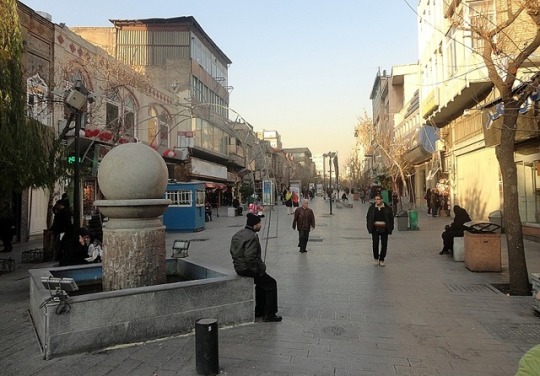
Without the I Word, Beware B and P
As Nancy Pelosi struggles to contain increasing demands for the Congress to impeach President Trump, his Secretary of State, Mike Pompeo ratchets up tensions in the Gulf of Oman, as it has done in countless other historical circumstances, making war with Iran look imminent. Now more than ever, Americans need to know that beyond oil, the Middle East, like the rest of the world, is divided between right and left. Iran is the leader of the left-oriented Shia version of Islam, while Saudi Arabia leads the right oriented Arab world. Meanwhile, Israel, as it continues to occupy Palestinian territory for over seventy years, has gone from being a left-oriented society in which the kibbutz played a central role, so far to the right that it often agrees with fascists. Across the Middle East as elsewhere,“Follow the money”, corresponds to the left-right divide.
Unlike American ignorance of current foreign affairs, few people across the world have a false idea of the French Revolution of 1789: driven by popular hardship, the sans culottes got rid of a monarch, opening the way for an organized left that carried out the Russian Revolution of 1917, followed, in due course, by the Chinese Revolution of 1949. These three revolutions duly claimed their place in history and in the popular imagination, however, after the defeat of Nazi Germany, the US installed ‘liberal’ parties in Western Europe, Eastern Europe modernized under a Soviet controlled authoritarian form of social democracy, while Iran was still a relatively poor country whose population was in need of everything from health care to education and housing. In 1953, when Iranians elected a lawyer named Mohammed Mossadegh to lead the country, the nationalization of their oil bonanza was a no-brainer. Alas, this coincided with the growing realization by the US of the crucial role of ‘black gold’, as American automobile ownership tripled, and petroleum became the magic fluid that generated prodigious development in the West. In what was to become a pattern, the CIA and M16 worked in tandem to overthrow the Iranian popular government and put the exiled Shah back in power.
Twenty-six years later, in 1979, popular forces carried out a revolution against the Shah’s iron rule that has never been understood by the West, which saw the new leaders exclusively as religious fanatics. In reality, when Ayatollah Khomeini returned from exile in France, he was accompanied by a socialist theoretician. Ali Shariati had been in and out of jail while teaching high school and campaigning for change. Eventually, he was allowed to accept a scholarship to France, where he studied with Islamic scholars, earning a PhD in sociology and the history of religions in 1964, while discovering the third world political theologist Frantz Fanon, collaborating with the Algerian National Liberation Front and campaigning alongside Jean-Paul Sartre for an end to French colonialism. Returning to Iran, Shariati founded the Freedom Movement of Iran, gathering followers throughout \society.
His sin was to have revived Shiism’s revolutionary claim that a good society would embrace religious values. He taught that the role of a government under a learned clergy, was to guide society according to Islamic values rather than managing it, allowing human beings to reach their highest potential rather than encouraging the West’s hedonistic individualism. Believing that Shia Muslims should not await the return of a mysterious 12th Imam, (as the Jews await ‘the Messiah’) but hasten it by fighting for social justice, even to the point of martyrdom, Shariati criticized the Shah’s clerics and translated the claims of Iranian Marxists that revolution would bring about a just, classless society into religious symbols that ordinary people could relate to. Seeing a direct link between liberal democracy and the plundering of pre-modern societies based on spirituality, unlike Fanon, he believed that people could only fight imperialism by recovering their cultural identity, including their religious beliefs, which he called ‘returning to ourselves’. (Like a growing number of contemporary leaders — such as Vladimir Putin — Shariati called religious government ‘commitment democracy’, as opposed to Western demagogy based on advertising and money.
The panic that gripped the West in 1979 when 52 American diplomats were locked-into the Embassy for 444 days, was heightened by Israel’s victory in the Six Day War a few years earlier. Since that time, while continuing to deny the Palestinians a state of their own, Israel has moved closer to the most powerful Sunni (i.e., conservative) Arab nation, Saudi Arabia, which supports ISIS and its offshoot terrorist organizations worldwide, and wages an unrelenting campaign against the tiny country of Yemen, whose revolutionary Houthis are also supported by Iran, in the millennial battle between Sunni and Shia.
Few Americans know that these two are strongly correlated to the left-right divide. Western media correctly attributes the conflict to attitudes toward Ali, the Prophet’s designated successor, but it features Shiites lashing themselves with chains in solidarity, without mentioning that the reason for Ali’s murder was his defense of the lower classes. In turn, that attitude was based on a disagreement over whether God had attributes, such as ‘justice’ and hence could demand that humans treat each other with respect and dignity.
Arising after the Prophet’s death, the argument centered around whether the Quran was an emanation of God, or had always existed. In turn, the answer to that question depended on whether God simply ‘is’ or whether, like humans, he has attributes, one of which would be ‘justice’, or solidarity, which would imply the existence of free will. At one point, a free will defender who got up and left the discussion was labelled a Mutazilla, or ‘one who has left’. During the following centuries, and mainly under the Abbasid rulers centered in Persia, the Mutazilla movement lead to the development of Shia Islam, with a different set of laws from those of the Sunnis, who still believe that individual lives are foreordained by a God who is neither ‘good’ nor ‘evil’, but simply ‘is’, and that men must obey Him without question. Under the cleric Wahhab, that conviction led to the extreme of Sunni Islam, in whose name terrorism is carried out to this day.
The notion of a ‘Shia arc’ suggests an equally threatening military entity, when in reality it is an ideological one. Although nothing could be further from the minds of those who hold Trump’s foreign policy in their hands, Ali Shariati and the Iranian revolution revived Shia Islam’s original message that men must treat each other with dignity and respect. The original seat of the Mutazilla movement was the city of Basra, located on the Persian Gulf Shat al Arab waterway, and the Shiite learning center of Najaf, near the southern Iraq/Iran border, was the headquarters of Iran’s exiled revolutionary leader, Imam Khomeini. After spreading from Iran to Iraq, Shia Islam reached Syria and Lebanon on the strength of its commitment to justice.
In Syria, the life values of Islam had already led to the creation of the Baaʿth Party, which in 1953 merged with the Syrian Socialist Party to form the Saddam Hussein’s Arab Socialist Baaʿth (Renaissance) Party. Although both countries belonged to the non-aligned, anti-imperialist and anti-colonialist movement, the merger failed. (The US suffered the Baath being the party of Saddam Hussein as long as he was waging an eight-year war against socialist Iran.) Syrian Shiism continues to be represented by the small Alawite sect headed by the Assad family. Reaching back to the ninth century, the Alawites, who pray sitting rather than prostrate, and celebrate some Christian holidays, had been rejected by the Shiite hierarchy until Assad’s father, Hafez al Assad, came to power in 1964. Though accused by the US of “killing its own citizens”, Assad’s son, Bashar, heads the only secular government in the Middle East (including Israel), and retains the educational system and Western social customs that prevailed under the French mandate (1923-1964).
In neighboring Lebanon, the Shiite militia known as Hezbollah represents a powerful political force in a tiny nation whose population is divided among half a dozen religions and sects, including the Christian Druze and Maronites. The picture painted for Westerners is of a rabble acting on orders from Iran, while Hezbollah is allied with the Shia militia Hamas in the struggle for an independent Palestine, making Syria ‘the frontline state’. (Alastair Crooke’s book Resistance: The Essence of the Islamist Revolution, attributes Hezbollah’s victories over the Israeli army to ‘horizontal’ organization, which encourages a high level of individual initiative, and is part of the surprisingly sophisticated knowledge of Western political thought by its leader Hassan Nasrallah.)
This makes the fact that the Second Amendment to the US Constitution, which reads: “A well regulated Militia, being necessary to the security of a free State, the right of the people to keep and bear Arms, shall not be infringed,” all the more ironic. America is the only modern nation whose citizens have almost automatic access to guns, resulting in thousands of murders every year, while its leaders insist that foreign national militias must be punished by a so-called ‘rules-based’ international community.
Last but not least, in this saga, like the cherry on the cake, the American public is oblivious to the decades-long ties between Iran and its neighbor, Russia, based on both a shared revolutionary commitment to ‘dignity and respect’, and to religious values. It is disquieting, to say the last, that when the two B’s threaten Iran, they are threatening Russia outside the narrative familiar to American voters.
1 note
·
View note